#that If You Think This is Not Written from a Perspective of Compassion and Grief for Trauma Survivors you just can't plain fucking read
Explore tagged Tumblr posts
Note
You always say that JKR's female characters have sexist characteristics, and I agree. Now I'm thinking, do the male characters have the same problem? I feel like we talk so much more about the female characters, because we analyse them from a feminist perspective. But are the male characters that much different?
When I think about a male character who gets portrayed in a sexist manner, of course Snape comes to mind. Because he doesn't have traditionally masculine traits, and often gets treated as too emotional or "hysterical", even in the moments he has every right to be angry. Do we have any other examples?
Ohhh my friend, you just pick my favorite topic: gender roles in fiction. This is gonna be so long that's because i didn't answered before. But what can I say? I love gender analysis. Well, the sexism in Harry Potter doesn't just harm or flatten its female characters, it also shapes the men in rigid, gendered ways. The narrative tells us what kinds of men deserve praise and which ones deserve ridicule or punishment, and those judgments often mirror traditional, patriarchal ideals of masculinity.
Severus is a prime example. He’s written with traits that are culturally coded as unmasculine: emotional intensity, awkwardness, deep attachment, and vulnerability. But instead of being treated with compassion or complexity, he’s portrayed as bitter, obsessive, even “pathetic.” His grief, rage, and isolation are often mocked or pathologized, rather than explored. The narrative treats his emotions as excesses, as if he should be more stoic, more composed—more “manly.” This isn’t just a character flaw—it’s a rejection of any masculinity that doesn’t align with dominance, physical bravery, or emotional control.
Neville, for example, also demonstrates how the story treats alternative masculinities. Early on, he’s timid, forgetful, and sensitive. These traits are framed as embarrassing until he becomes braver, more assertive, and physically courageous. In short, until he conforms to the warrior-hero mold. Only then does the narrative grant him respect. The same applies to Harry himself: when he expresses emotions —particularly grief or anger— he’s dismissed as “moody” or irrational. The story often limits him to being a brave, self-sacrificing leader, but gives him very little emotional support or space for vulnerability. There's no real model for healthy emotional masculinity in the series, only the expectation that boys must “man up” to be heroes.
Hagrid is another example: deeply nurturing, emotionally expressive, and connected to nature and animals, traits often associated with care work and maternal energy. But instead of being respected for those qualities, he’s infantilized and often used as comic relief. His gentle masculinity is never truly valued: is ridiculed.
Contrast this with how the narrative treats women: the only ones who are consistently admired or respected are those who adopt traditionally masculine (but specifically patriarchal) traits: McGonagall, Ginny (in the later books), Tonks (to a degree), and of course Hermione. These women are praised for being rational, assertive, clever, emotionally restrained, and good at traditionally male-coded skills like dueling or strategy. But when they express vulnerability or compassion —or engage in emotional labor— they’re often sidelined or seen as less effective. The narrative doesn't reward care or softness in women any more than it does in men. Feminine-coded traits —empathy, nurturing, emotional openness— are simply not respected in Rowling’s world, she doesn’t uplift a deconstructed, emotionally mature masculinity in either men or women, she simply maps the traditional masculine ideal onto certain female characters and punishes the rest. The politics of care, softness, emotional labor are consistently devalued in the narrative, regardless of who displays them.
And this binary logic extends even to the depiction of villains. Take Lucius Malfoy and Tom Riddle, for instance. Both are presented as elegant, refined, beautiful even, traits often associated with femininity. Tom is repeatedly described as “handsome,” charismatic, and physically graceful. Lucius is cold, vain, poised, and his long blond hair and pristine appearance mark him as almost effeminate. These aesthetic choices are not incidental: the text uses their "feminine" physicality and polished manners to underscore their moral corruption. Their deviation from rugged, physical masculinity becomes part of their danger. It reinforces the idea that ambiguity—especially gender ambiguity— is inherently threatening.
This is a very old trope: the villain whose femininity is a sign of deceit, vanity, and perversion. In contrast to the "good" masculinity of characters like Lupin, Sirius (though flawed), or even Dumbledore in certain contexts, Tom and Lucius are coded as deceptive, performative, and manipulative, traits historically attributed to women in patriarchal literature.
Rowling’s portrayal of masculinity in the serues isn’t just about punishing deviation from patriarchal norms. It’s also about celebrating and excusing those who most embody traditional, dominant masculinity, even when they behave in deeply harmful or morally hypocritical ways. Two of the clearest examples are Sirius Black and James Potter.
Sirius is a textbook case of this. The narrative goes out of its way to frame him as attractive, charismatic, rebellious, and brave, the quintessential "cool bad boy." He’s constantly described in a romanticized, even fetishized light: leather jackets, long hair, brooding stares, a tortured past. Rowling makes sure we know he was handsome as a teenager and still has that allure, despite everything. But beneath that carefully maintained image lies a deeply flawed, morally inconsistent man. He is impulsive, often cruel, emotionally stunted, and astonishingly reckless with Harry, treating him less like a child in his care and more like a replacement for his lost best friend.
Sirius clearly struggles with trauma and imprisonment, but the narrative infantilizes him to excuse his worst traits. His emotional immaturity, his inability to grow beyond the age he was when he was imprisoned, is framed as tragic rather than irresponsible. His deep resentment of his family background, while understandable, leads to abusive behavior, yet it's never really questioned or addressed. He taunts Kreacher, encourages Harry to take unnecessary risks, and repeatedly projects his unresolved issues onto others. And yet, instead of holding him accountable, the narrative bends over backward to present him as misunderstood, loyal, and ultimately noble. His hypermasculine traits—defiance, aggression, emotional repression—are romanticized, even when they make him a terrible role model and Rowling excuses him constantly because well, he's a man isn't him? Men are men after all.
James is similarly protected by the narrative. He's introduced, retrospectively, as a school bully: arrogant, cruel, and dismissive of others (especially Snape). In SWM makes this abundantly clear: he bullies Snape for no reason other than boredom and ego. But Rowling frames his redemption not through any internal change or reckoning, but through Lily. We’re told James "grew out of it" because Lily wouldn't date him otherwise. The implication is that the love or approval of a good woman is what transforms a toxic man into a worthy one, a deeply sexist trope that places the burden of male moral development on women, rather than demanding accountability.
James doesn’t evolve because he recognizes his behavior was wrong, he changes because it wins him the girl. There’s no moment of reflection or apology, no exploration of the damage he caused. Instead, the narrative assures us that because he was brave, rich, talented, and confident —because he died fighting Voldemort— his earlier behavior is irrelevant. He’s mythologized as a hero, a perfect father, a natural leader. Once again, the narrative rewards hypermasculinity —dominance, swagger, courage in battle— while erasing the harm it can cause when it goes unchecked.
These character arcs are deeply gendered. Sirius and James are not punished for their aggression, recklessness, or cruelty,they're forgiven, romanticized, even sanctified, because they embody traits traditionally associated with masculine greatness.
So when we step back, we see that Rowling's narrative doesn't just operate in a patriarchal world: it actively endorses patriarchal values. The story rewards characters who conform to traditional masculinity, regardless of gender, and punishes or ridicules those who don't. Emotionality, care, and vulnerability —whether in men or women— are dismissed or treated as weaknesses. And even when characters are powerful, if they possess feminine-coded traits, that power is portrayed as dangerous, unstable, or even evil.
The result is a world where gender roles are rigid, and where only patriarchal traits —strength, control, intellect, emotional repression— are validated. That’s not just a flaw in the world-building; it’s a political stance embedded in the structure of the narrative itself.
#harry potter#harry potter meta#jk rowling#jk rowling internalized misogny#misoginy#gender roles#gender roles in media#feminist critique#feminism analysis#toxic masculinity#toxic male characters#severus snape#neville longbottom#sirius black#james potter#lucius malfoy#tom riddle#rubeus hagrid#sexism#sexism in media#gender stereotypes#gender studies#gender politics#harry potter books
74 notes
·
View notes
Note
Are you still taking requests?
I was wonder if you could write for Mira!reader in Teen Team or if you want Zoey!reader since Zoey is your favorite
No pressure tho
𝐅𝐨𝐮𝐫 𝐓𝐢𝐦𝐞!


Zoey!Reader
Note // RRRRGHHH YOU LIT THE BRAINN, yes I’m finna do Zoey!reader for this. It’s mainly how u work out as an individual duo with each member. It's mainly just Eve and Rex cause I have better experience writing those two the most.
Summary || the musical member of Teen Team! you can think up lyrics for your songs on the go and your moves are exceptionally deadly.

Atom Eve:
Emotion meets logic, spirit meets science. You and Eve are a beautifully balanced team. She’s measured and pragmatic; you’re driven by intuition and emotion. You ground her spiritual understanding of the world, and she expands your perspective on what change looks like in the material realm.
The team says you two are the moms—you being the “will smack a demon with a sacred blade for you” kind, and Eve the “gently rebuilding the world around you while holding your hand” type.
You trust each other’s instincts completely. Eve respects your Spirit Vision and mystical awareness more than any sensor tech. When you say “something’s coming,” she doesn’t ask questions—she’s already beside you, palms glowing.
You’re a battle duo that could take on armies. You create sacred energy weapons midair; Eve reshapes terrain into shields, platforms, or energy blasts. Fights with you two are beautiful and brutal.
Your knife-throwing precision is amplified by Eve mid-fight—she might redirect a missed throw or transmute a blade into crystal mid-flight to pierce demon armor.
If you ever run out of knives? She transmutes rubble into polished spiritual daggers. You enchant them with Spirit Magic. It’s seamless. It’s deadly. It’s art.
Your signature combo: "Purification Bloom" — you carve runes into the earth with your daggers; Eve supercharges the ground with molecular energy, creating an explosive wave of spirit-light that wipes out demonic corruption.
You’re both intensely private, so your connection is built in quiet moments: long silences watching the stars after patrol, sitting together in a ruined park she just rebuilt, you softly singing while she helps you clean your blades.
Eve sees the way you carry grief—for your fans, the souls lost to demons—and she never tries to fix it. She just sits with you in it. That’s part of why you love her as a person so much.
You admire her control, her compassion, and her constant drive to do better. She admires your raw strength, your fire, and the way your voice can shift from sacred hymns to throat-shattering rap verses.
Sometimes, you help her with her stress. You wrap her in a protective spirit barrier and just let her be. And sometimes, she helps you sleep when you’re haunted by spirit dreams—rearranging the molecules in your room to make it quieter, warmer, safer.
She was in awe the first time she heard you rap. Not just the rhythm—your lyrics had purpose, your delivery had power. You were a warrior and an artist. She couldn’t stop watching.
Once, she helped create the stage for a surprise rooftop fan concert you threw post-mission. She generated floating platforms with lightshows to match your beat. You called her your “stage angel”—she rolled her eyes, but she was glowing.
You’ve written verses about her. Not that she knows. (Okay, maybe she found your notebook and cried a little. She’ll never admit it.)
Your Golden Honmoon dream resonates deeply with Eve. She believes in reshaping the world for the better—and the idea of spiritually healing it strikes her as beautiful, vital, and worth fighting for.
She's fascinated by your Spirit Magic. You’ve spent hours explaining soul energy flows and demon corruption. She’s even helped you study it—scanning areas where Honmoon energy falters, calculating patterns.
You both believe that the world can be better—not just by destroying evil, but by rebuilding something sacred in its place.
Eve often finds herself wondering how you keep going—after everything you’ve lost. You tell her, “Because if I stop, they stay lost.” That stays with her. Always.
She’s never been one for spiritual stuff, but when you’re around, she finds herself believing—even just a little—that maybe souls linger. Maybe they sing.
You told her once, “You change matter. I change spirit. But maybe we’re both just trying to save the pieces people leave behind.”
That was the moment she realized she was in love with you.
Rex Splode:
You two are total chaos on the surface—bickering constantly, throwing jabs at each other mid-battle, arguing over music playlists during patrol.
But anyone who’s spent more than five minutes with you both knows it’s just your love language. You’re ride-or-die partners, and when it’s serious, the jokes drop and the synergy kicks in hard.
You balance each other—Rex is all reckless bravado, while you bring spiritual clarity and discipline (when you're not spitting fire in a rap battle).
Your powers are a lethal combo: Rex throws explosive objects, and you throw sacred knives and spirit-forged weapons. Together, it’s lightshow carnage with style.
You’ve saved his life more than once with your Spirit Vision, sensing demons or hidden threats before he even knows they’re there.
He jokes that your spirit daggers are “anime as hell” but lowkey thinks they’re sick as hell. He’s tried to charge one with his kinetic energy once—you had to slap the knife out of his hand before he blew both your eyebrows off.
Your combos are almost choreographed. You slice through a demon’s guard; he plants an explosive to blow its core. He calls it “Boomblade Special”, you call it “Please Shut Up and Just Throw the Thing”.
He pretends to hate your fans, but gets stupidly smug when they swarm you after a mission. (“Yeah, that’s my girl. Yeah, I’m in her band, kinda. No, I don’t rap—well, not seriously—”)
You once caught him listening to one of your unreleased tracks on repeat. He claimed it was “accidental” and “the beat slapped.”
He’s definitely joined one of your rap lives on IG just to drop dumb comments like “Bars 🔥 but I could out-rap you.” You responded by freestyling a verse about his last fight where he blew up his own boot. The fans loved it.
When the world goes quiet, he sometimes opens up. Late nights post-mission, when you’re healing him or tending to your own wounds, he’ll let pieces of the past slip—his childhood, the experiments, how lost he used to feel. You don’t push. You just listen and maybe squeeze his hand gently.
He says dumb things to protect himself emotionally. You know this. So when he tells you your spirit weapon “looks like a glowy butter knife,” you just smirk and tell him it slices egos too.
You’re one of the few people who can actually call him out without him getting defensive. You don’t yell or insult—you just look at him, tired and knowing, and he’ll instantly feel like a jackass and apologize.
He’s fiercely protective of you. Borderline reckless about it. But you’ve made it clear—you’re not a damsel. He’s learned to trust that. He’ll still get edgy when you fight Gwi-Ma-tier threats, but he’s trying to respect your strength.
After you defeated Gwi-Ma, he didn’t say “good job” or “congrats.” He just sat beside you quietly, handed you a warm energy drink, and said: “You did what none of us could. I’d follow you into hell if you asked.”
You once enchanted one of his explosive cylinders with spiritual energy—it exploded quietly, in pure white light, and vaporized a demon instantly. You’ve been experimenting with fusing your powers ever since.
You drag him demon hunting sometimes for fun. He complains but secretly enjoys it, especially the post-hunt ramen runs.
He once made you a mixtape—half of it was his favorite punk rock, the other half was him trying to rap. You kept it. He doesn’t know.
He doesn’t totally get the spiritual weight of the Golden Honmoon, but he gets you. So he supports it because it’s your mission.
One time he told you, “If making that Golden Moon means those souls get peace, then hell yeah—let’s melt down every demon in our way.”
#invincible eve#invincible fluff#invincible crossover#invincible fanfic#invincible#invincible x you#invincible x reader#invincible x y/n#invincible x gender neutral reader#invincible x fem!reader#atom eve#atom eve x reader#invincible rex splode#rex sloan x reader#rex splode x reader#rex sloan#rex splode#teen team#teen team x reader#kpop demon hunters#zoey kpop demon hunters#zoey#zoey kpdh
79 notes
·
View notes
Text
It’s been awhile, huh?
Well, Requiem’s on my mind again, so I have something to say.
I’ve previously discussed how I like the ways in which Kindred in Requiem are portrayed as more alien than one might expect— they’re warped by the Blood, made into a kind of metaphysical wound, a contradiction in terms: A living corpse.*
Kindred aren’t human anymore, not really. Humans don’t live forever. Humans don’t catch fire in sunlight. Humans don’t have the Beast gnawing at them, pushing them to kill and conquer and control. And that’s the horror, as I’ve written on and as the test makes abundantly clear: to look human, to maybe even feel human, but to be something else… it’s a nightmare, and the only way to ward it off is to act the part of Humanity, even as it decays inside you.
Maybe there’s some kind of redemption in what you pretend to be, after all.
But something occurred to me as I was rereading the corebook, which is how the Strix play into all that. For those not in the know, Strix are these shadowy owl things that very clearly have a lot in common with vampires, but unlike the Kindred were never human. And as such the Strix don’t have a pretense toward Humanity, they only bother with empathy insofar as it helps them prey on their victims, and they have no interest in compassion or justice or mercy, because all that does is shackle them.
What’s interesting to me, though, is that the Strix are shown to hate Kindred. They reserve especial anger and cruelty for their once-mortal cousins, and are said to go out of their way to torment them and show them how useless human morality is.
And like… why? Why should they care? The book mostly just says that the Strix are insulted by how vampires try to act like humans, but what difference does it make to the Owls? Shouldn’t that just mean the Strix get more mortals to prey on?
I thought about this, and I think the answer lies in the sections about how the Strix have a history with vampires. At first, I kind of read this as more Chronicles of Darkness mystery building (which I’m a big fan of!)— “the Strix are enigmatic, here’s some plot hooks about how they might relate to Kindred, season to taste, etc.”— but then I thought more about it.
If the Strix are tied to the early history of Kindred, if they’re legitimately the reason vampires exist into modern nights, if they might even be the founders of the Clans, then of course they’re insulted by vampires still clinging to their Humanity.
Think of it— in the old nights, before sprawling cities and labyrinthine conspiracies, there were outcast undead, hungry monsters without a future or a purpose. And the Strix, stepping out of the primordial dark, gave them a gift— they showed their lesser cousins the way to master their Blood and become something more. They share a bond with these vampires, and they grant them power to foster it.
And then the vampires crawl back to the mortals.
The “Kindred” pretend to be the very thing the Strix delivered them from. The Strix dragged these wretched dead out of despair to become like them, and they threw that all away to play-act at grief and penance.
So what is there to do but show them the same scorn? What else is there but disdain? What a joke, from the Strix’s perspective— to be delivered by monsters, and then to worship Humanity.
Perhaps the greater joke is this: The Owls, defined by their inhumanity, are driven by a very human motivation indeed: Jealousy.
*It’s interesting to think about this contradiction in relation to Geist. The Bound are also life and death brought together in defiance of the natural order, but they’re generally portrayed as for more human and “normal” than vampires are. The difference, I suspect, lies in the type of symbiosis at play. Geists and their Bargain are a form of mutualism, where the dead and the living agree to cooperate to resist the call of the grave. The Blood, though, infests and infects, it crawls into the veins of a corpse and forces it to rise. If the Bargain is mutualism, then the Embrace is parasitism and predation— and that makes all the difference.
23 notes
·
View notes
Note
5, 6, 18, 21, and 23 for frodo!! <3
Thank you
5. What's the first song that comes to mind when you think about them?
"Whither Must I Wander?" from Ralph Vaughan Williams' song cycle Songs of Travel. (I like this recording by Anthony Rolfe Johnson.) The opening lines are "Home no more home to me / Whither must I wander?" and the sense of leaving home never to return almost makes it feel like it was written specifically for Frodo.
6. What's something you have in common with this character?
I definitely share his vulnerability to thoughts of despair. Right now I feel like I don't share any positive traits with him.
18. How about a relationship they have in canon with another character that you admire?
Honestly, I like his relationship with Boromir and feel like it is overlooked. The scene when Boromir says to him "You carry a heavy burden, Frodo. Don't carry the weight of the dead" makes my heart hurt, but it's a beautiful moment. I'm sure Frodo needed to hear that in his time of fresh grief, and in that moment Boromir is the only character to show him kindness or acknowledge him at all. Everyone else in the Fellowship, even Sam, looks away from him. I also love when Boromir says something like "I know why you seek solitude. You suffer; I see it day by day." Even as the Ring is about to take him, Boromir shows true sympathy and compassion for him.
21. If you're a fic writer and have written for this character, what's your favorite thing to do when you're writing for this character? What's something you don't like?
I've pretty much stopped writing fics at this point; I seem stuck in a permanent state of writer's block, and I can't get motivated to do anything. With the fics I have written about him, I like writing from his point of view. I've tended to prioritize post-Quest fics, and the post-Quest passages from the books aren't written from his POV, so it's nice to write from his perspective. I don't like writing dialogue, not just for him but in general. I feel like I'm terrible at writing dialogue.
23. Favorite picture of this character?
I don't have a single favorite, but this is one of my favorites. I generally love images of him looking down. I've also previously used this picture as a profile pic.
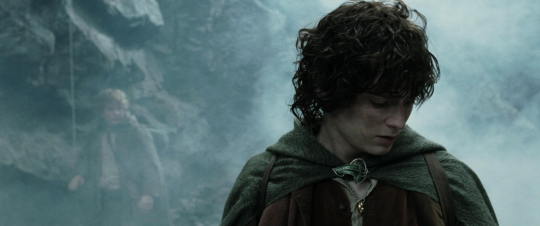
#spacedadpicard#answered#sidebar but I'm currently crying over that Boromir line about carrying the weight of the dead
8 notes
·
View notes
Note
Interesting to read your dom/sun analysis. I tend not to read that trope because a large amount of time it’s written badly, so thank you for explaining it to me. The majority of Klaine fics of this trope have Kurt as dom, and I feel the author is wanting to imply he is the stronger, decision maker, more capable of the couple. What do you think?
Thanks for the ask! I'm sharing this as -my perspective only- and each person, of course, can headcanon as they please. I am incredibly passionate about this subject and trope, and I could write about another 100k words.
A true dominant 'doms' out of service, love, and compassion for their sub or fellow human being. It's not born entirely of ego or acted on in a need to control others and/or some magical intelligence that makes them better at making decisions or being in charge. Although, that doesn't exclude the possibility that they might be those things. Someone should not be labeled a dom simply because they have the ability to be strong, just as someone should not be labeled submissive because they have the ability to surrender (and I always use the word surrender as a sacred, consenting action).
In the fewest words possible, a dom/sub relationship is a trust so profound that they trust someone to be what they need. Sometimes as a sub, that is the dom making a decision for them, sometimes it's holding their hand, sometimes it's asking them to kneel so they can go deep within, sometimes it's pain (like edging or crops etc if the dom/sub pair is into that) because they feel so numb in this world that they're begging their dom to help them feel something. It can be anything and everything as they explore what they each need, but it is never about power/and the powerless. There must be consent, understanding, and a safe way out for both parties if desired. The surrender is all about letting go, surrendering so you can find that thing you need, whether it's ethereal or tangible. It's trusting that the other can provide it (either the dom or sub). A dom's true satisfaction comes from knowing that they are accomplishing the giving and the helping (this can come in various forms that people outside the scene might not understand).
I don't know the intention behind other author's takes, they are vast and varied. I speak only for myself, when I say there are dozens of reasons why I think that Kurt and Blaine each exhibit both tendencies at different times. I don't only see Kurt as a dom, just as I don't only see Blaine as a sub. I can observe that in different circumstances, they each take up different roles. They each have strengths and weaknesses, and they both need help at different times. They are each brilliantly divine and magnificently flawed, as we all are. And that's why I love AUs. I love to take these complex characters and say. "Okay, what if this one thing was different or that thing? What then?"
I go into DEEP character studies in my D/s stories. If you've ever wanted to try one, I promise you they aren't what you're used to in this trope. They are always equals. Always loved and always safe with each other (out in the world is a different thing altogether).
Just One Look dom Blaine and sub Kurt This one is about Kurt fighting his submissive instincts (he has no idea what they are), and when he realizes why he's having them, everything changes when Blaine discusses in great detail what a dom/sub relationship actually is.
Since Sense Sensory dom Kurt and sub Blaine Explores how the boys found each other again after a long separation. They have many conversations about how the dom/sub scene has helped them overcome grief and loss and manage their strengths and weaknesses.
Soulsons and Seatstars dom Kurt and sub Blaine (with hints of dom Blaine) Is an AU world where a natural chemical balance is needed. A dom cannot live without a sub, and a sub cannot live without a dom (that's an oversimplification), so if you are new to dom/sub, this is an interesting take because it helps you better understand the symbiotic relationship in tangible terms. Again, they talk so much about their dynamics. And this one might surprise you how Blaine might be a sub, but he's got a sassy tongue and a dom streak that Kurt very much encourages.
Thanks for the question. I hope I answered it, alright. I love these boys so much! Klaine owns my whole heart and soul. I always want the best for both of them.
7 notes
·
View notes
Text
So, for the former church kids - everything fundamentalism taught you about Job is incorrect. The book fundamentally overturns basic principals of religion found in earlier texts of the Bible (Oh yeah, Job isn't the oldest book in the Bible like we were all taught, it was probably written during the Persian era) and is responding to the same kind of continued suffering for no apparent reason that caused a lot of us to leave the church after getting sluffed off by the kind of people that the book of Job is criticizing. I'm only gonna respond to one claim here which I think shows how ridiculous fundamentalism can get, and that's the claim that Job's wife told him to curse God and die. The Hebrew text does not have her telling Job to curse God - Job's wife actually says "Do you still maintain your integrity? ברך (bless) God and die" The first part of her question "Do you still maintain your integrity?" Is central to the book of Job - everyone thinks Job has sinned and everything that is happening is his fault for being a sinning sinner. The thing is, the very first line in book of Job says that Job has not done anything wrong, nor is he the kind of guy that does wrong stuff. This is established by the narrator as narrative fact - and yet his friends go off telling him what a piece of shit he is for the next 40 or so chapters. God ends up chastising Job's friends for being pious holier than thou assholes who thought they had all the best theological answers and simply didn't - because their answers didn't reflect the realities of life. The second part of her question "Bless God and die", the reader is invited to make an interpretive choice here. Previously in Job the word for "Bless" has been used to literally mean "Bless" but it also gets used to euphemistically to mean "curse". The way the Hebrew text is written invites the reader to interpret what's she is saying. "Job, my wonderful husband, idk what's happening rn but God clearly has it out for you, Bless God one more time and die in your integrity" or "Job, idk wtf you did but it must have been bad to deserve this. You may as well curse God to his face and go to the grave because that's better than making us all suffer for your sins." You can guess which one the fundies prefer to side with, and translate their Bibles to say (The NRSVUE does have a footnote, I guess). How this gets interpreted is based on how you see Job's wife, or maybe how you think of women as a whole. Yes there are still problems. she deserves a name - although this story is entirely literary and none of the people are real people - we should still treat her better than this. There should be compassion for her in the narrative, and where there is not pastors, commentators, and believers should see her unnamed suffering, and open their eyes to the suffering of the women around them - literary creation or not, is she not their neighbor?
I find it a little ironic that this tumblr user's reaction to this story is playing out in real time the Good Samaritan. For centuries pastors, commentators, and church goers have simply walked by this suffering woman for interpretive reasons until in the year of our lord 2024 when a Tumblr user stops to help her in her suffering. Last, as an aside, the book of Ruth deals with similar ideas of loss, grief and suffering from a woman's perspective - but without the wealth, male privilege, and the ability to cry in the dirt for 40 odd chapters like Job - because Naomi has to deal with questions like "omg how do I eat with no man in patriarchal culture".
Idk I think Job's wife really went off when she told him to curse God and die. It's interesting how there's no oxygen for her suffering in the narrative. She lost her children too. She lost her home too. Her health was taken from her too. Everything she had was stripped away by God. And yet there's no compassion for her. Not in the narrative nor in the commentaries or the sermons. She isn't even named.
2K notes
·
View notes
Text
I am briefly pausing my normal RWBY content to talk about something completely different: Kang Soo-Jin.
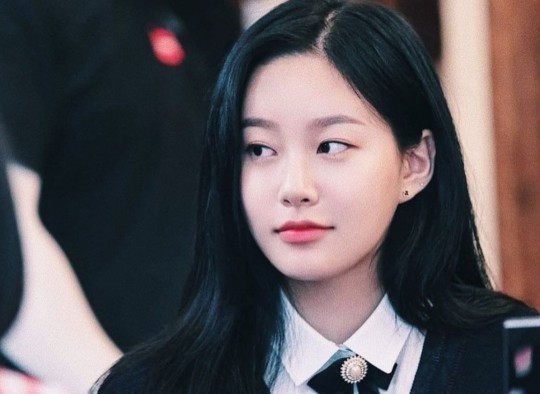
I binged True Beauty recently. As in, “I haven’t managed to watch anything new in half a year, discovered this drama, and promptly marathoned 14+ hours of content,” so to say I’m enjoying it is an understatement. I might do another post sometime about why I think the show works so well, but for now, like many (drama only) viewers, I’m specifically grappling with Soo-Jin’s descent into antagonist territory. At first I was just as shocked and disappointed as others seem to be, but upon reflection I don’t think this is badly written in the way many fans are claiming. To frame this as, “I can’t believe they would make wonderful Soo-Jin suddenly OOC and bully Ju-Kyung over a guy!” is ignoring core parts of her character. I’m as sick of the girl-hates-girl-over-guy plotline as the next viewer, but in the interest of acknowledging that there are exceptions to every rule, I think this is one of the times where that choice makes perfect sense.
Soo-Jin has been abused throughout her life and I’m not simply talking about the fact that her father hits her. Though that’s obviously horrific, what I think is more pertinent to this conversation is the intense competitiveness her parents have instilled in her. The physical abuse comes about because Soo-Jin fails (in their eyes) to be the best, which is where Ju-Kyung comes in. The Soo-Jin we knew in earlier episodes wasn’t faking. She isn’t an inherently evil person who was just waiting for the right time to show her true colors. Rather, at the start of the story Ju-Kyung—crucially—was not in competition with Soo-Jin. Or rather, Soo-Jin did not perceive her as competition. She’s after the best grades in the school and Ju-Kyung is notoriously at the bottom of the class. All she has going for her are her (new) looks and her easy-going personality that makes her popular, two things that Soo-Jin isn’t interested in. Even if she were, those things already come naturally to her too. She’s already friends with Soo-A and, as is commented on multiple times, naturally beautiful without any makeup on. Soo-Jin has been taught—literally had it beaten into her—that she must be the best and in the beginning of the show she pretty much is: popular, mature, confident, smart… just not the smartest in her class. Ju-Kyung doesn’t threaten any of that, so friendship initially comes easily for Soo-Jin, the sort of friendship that allows her to chase perverts off busses or hide her friend’s real face.
This changes once Soo-Jin’s “perfect” mask begins to slip. They’re heading towards college, she’s running out of time, and she still hasn’t managed to take the top spot in the class. Worse, she drops out of the top ten. This exacerbates the abuse to the point where, as we see, she’s constantly in the bathroom trying to cope by washing her hands. Any tiny deviation from that “perfection” — like, say, leaving your tutoring session when you realize your lifelong friend just got devastating news — results in the sort of yelling/physical abuse she can only escape from via a locked door. While things get worse on her end, they get better on Ju-Jyung’s. Her grades go up some and she becomes even more popular, attracting not only school-wide attention, but the attention of the two hottest guys too, including Soo-Ho. For a while this is still fine from Soo-Jin’s perspective, but things really take a turn when Ju-Kyung changes Soo-Ho. Meaning, she helps him come out of his shell and teaches him how to be a kinder person… which includes being a better friend to Soo-Jin. The Soo-Ho who suddenly lies and announces that they have to go study just to get Soo-Jin away from her father’s insults, all of it stemming from a small tick he paid attention to, or comforting her while she sobs over the abuse… that Soo-Ho didn’t exist at the story’s start. He was too wrapped up in his own grief and has been that way for a long time. They may have known each other since childhood, but Soo-Jin and Soo-Ho don’t appear to be particularly close in the past—all Soo-Ho’s flashbacks are with Seo-Joon and Se-Yeon. But that starts to change once Soo-Ho himself changes. Soo-Jin’s ability to keep it together is unraveling, Soo-Ho is opening up and becoming more emotionally available (something Soo-Jin even comments on), then her whole class starts eagerly talking up how good they would be as a couple… so Soo-Jin sees a lifeline. Soo-Ho will care for her even when no one else will. Of course he will. She’s already seen him be that person multiple times.
The problem is that Soo-Ho has his own life and his own problems to grapple with. Between grief over See-Yeon, panic over telling Ju-Kyung how he feels, and the initial rush of dating—what couple doesn’t want to spend all their time together at the start?—he doesn’t have much energy for Soo-Jin. Which from his perspective is fine. They don’t normally hang out together outside of study groups, so yeah, he can put off a conversation with her… not realizing that Soo-Jin is now putting all her emotional eggs in his basket. By the time her feelings are coming to light, Soo-Jin is actively sabotaging her own attempts to get attention and compassion from Soo-Jin. By manipulating them—here’s a new scrunchy to remind you that you’re my best friend and you can’t ever betray me, here I am showing up unannounced at your apartment and guilting you into not spending more time with me, etc.—Soo-Jin has put Soo-Ho (rightfully) on his guard. He’s wary of having a private conversation with her about something she won’t name when he knows Ju-Kyung has been a mess over losing her friendship. He has no desire to listen to her confession of love after she’s just tossed Ju-Kyung’s beloved necklace into the fire. In her efforts to ensure that Soo-Ho pays attention to her, she only succeeds in driving him away.
All of which makes Ju-Kyung the enemy in her eyes. The new competition. To her mind, friendship and love cannot co-exist because Ju-Kyung stands in the way of that love, therefore one has got to go. (In contrast Seo-Joon, coming from a loving family, is in time better able to accept that he can be friends with Soo-Ho even though he likes Ju-Kyung. We can discuss the problems inherent in giving one plot to the girl and the other to the guy, but as they are, these characters have concrete, in-world reasons for their different reactions to what’s essentially the same situation.) And why does love (“love”) win out over friendship? Because Soo-Jin has latched onto Soo-Ho being her boyfriend as the way to finally “win” at life and fix all her problems. It’s fine if she’s not the best provided she’s dating the best, just look at how much Dad fawned over him. Second place academically is suddenly an option provided the top student is on her team, so to speak. The fact that Soo-Ho is also one of the most handsome, a great athlete, super rich, and one of the few people to provide her with feelings of safety certainly doesn’t hurt matters. And the only thing that stands in her way of securing this life-saving “win” is Ju-Kyung. Who is she? No one compared to Soo-Jin. Her grades are terrible. She’s not wealthy. She’s pretty… but oh, only with her makeup on.
Soo-Jin doesn’t need makeup, so why not win this competition by showing the whole school—showing Soo-Ho—what a fraud Ju-Kyung is?
From Soo-Jin’s perspective she’s done the math and come out on top. Everything that (supposedly) matters she either has equal to Ju-Kyung, or is superior, therefore it’s obvious that Soo-Ho would choose her in the end. She says at much: If I had confessed first you would have loved me first, so now that I have confessed you’ll break up with her. Hell, even Ju-Kyung believes this. She has the nightmare about Soo-Ho learning that Soo-Jin has feelings for him and immediately, publicly breaking up with her. After all, if he suddenly has both as an option the winner is obvious, right? It’s all about competition, what they’ve been taught to believe is a competition: Ju-Kyung through her bullying and Soo-Jin through her abuse. The difference is that Ju-Kyung has had the whole series with Soo-Ho (and others) helping her slowly unlearn this mentality. Soo-Jin had the rug pulled out from under her in an instant.
Soo-Ho says no, I wouldn’t have loved you if you had confessed first and I’m not going to date you now. It’s important to realize that this shatters Soo-Jin’s entire world. It’s not about a girl being upset that she can’t get the guy — not even about Soo-Ho as an individual, really — it’s about an abused girl not knowing how to grapple with the fact that she finally did everything “right” and still couldn’t “win,” coupled with losing the last bit of security she had. Soo-Ho broke the unspoken rules Soo-Jin’s father beat into her and she doesn’t know where to go from there. She literally has no one else to turn to. So she falls back on the only way she does know how to handle a situation like this: by still trying to win. If Soo-Ho won’t admit that she’s better, she’ll force him to realize that by plastering Ju-Kyung’s “ugly” face all over social media. Which, to be clear, isn’t an excuse. This isn’t meant to be a way of absolving Soo-Jin of her absolutely horrific actions, only a means of explaining them. Her descent, while shocking to those of us who loved her initial character, is well written because it’s a nuanced look at what can happen when you abuse a kid her whole life and teach her that competition is everything. Oddly enough, she’ll apply a competitive outlook to everything and deal with her stress in unhealthy ways. Ju-Kyung is a victim of Soo-Jin now, but Soo-Jin is a victim too. Her home life has ensured that she does not know how to accept failure—or what true failure even means—so it was inevitable that when things got bad, she’d try to fix it in ways that hurt both her and those around her. It’s all she knows how to do.
So far less “Perfect girl goes ooc and abandons her friend over a boy” and far more “Abused girl falls into a terrible, but predictable cycle that the other stressed high schoolers around her are not equipped to break.” Soo-Jin’s story isn’t bad writing, it’s tragic. Thanks for coming to my three page TED talk ✌️
***
2/4/21 FINALE UPDATE!
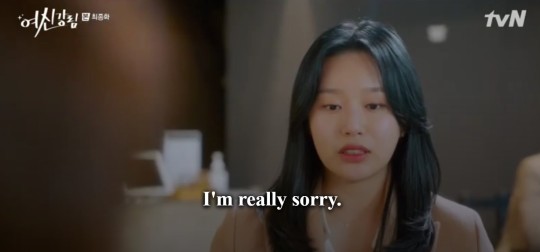
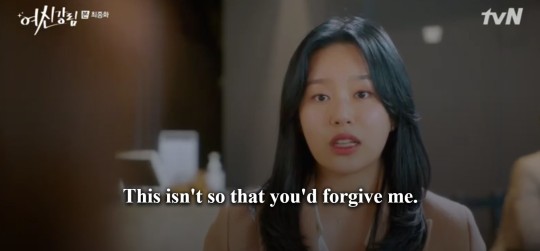
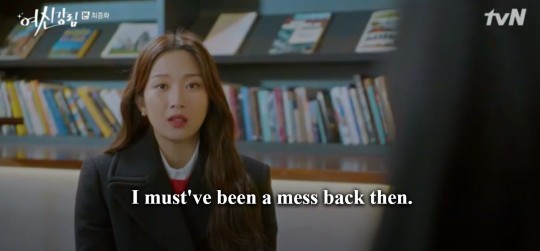
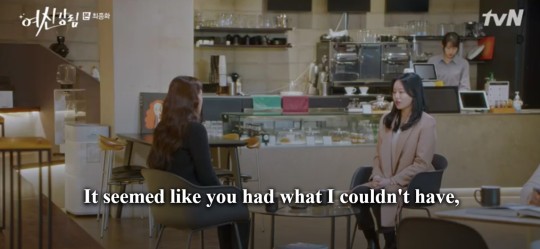
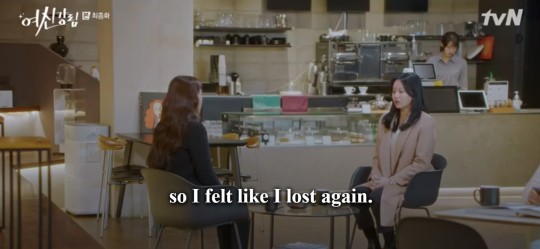
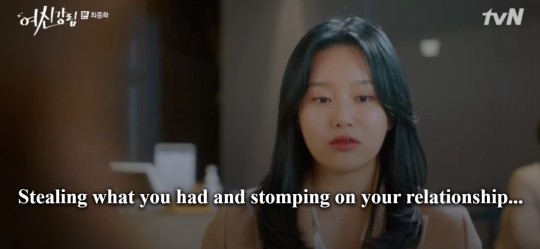
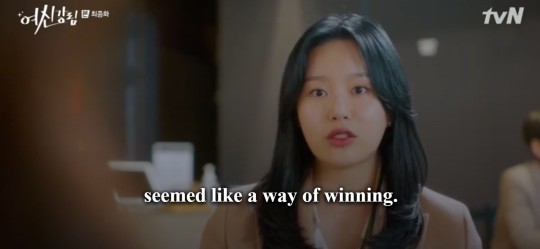
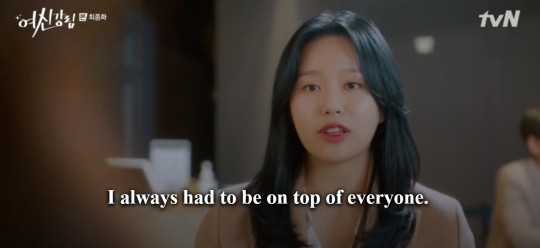
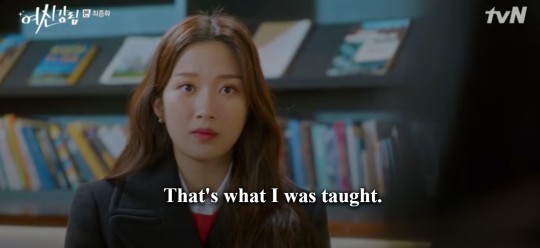
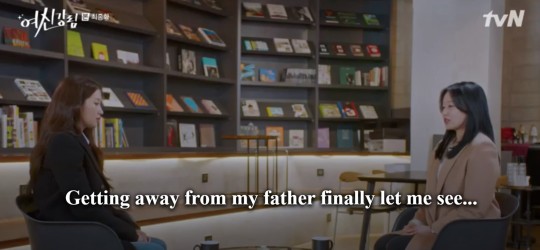
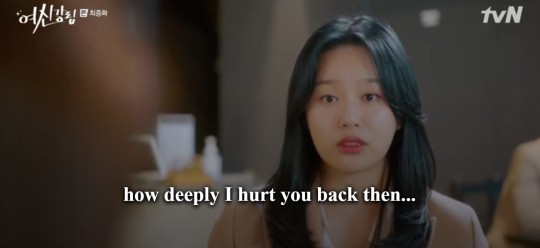

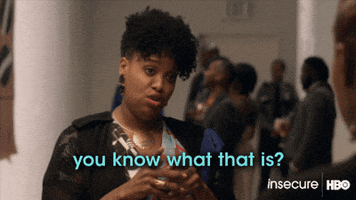
478 notes
·
View notes
Text
LuNa analysis: Emotional and Intellectual chemistry
This is a special edition meant to help a friend explain this aspect of Luffy and Nami's relationship as potrayed in Oda's works (excludes the anime adaptation). It's no something truly new, it's more like a summary of multiple analyses made in this blog and other places.
The first time we mentioned this particular subject in this blog, the idea was to showcase the difference between "sexual tension" and the concept of chemistry.
Shallow fans sometimes used both terms interchangeably as if they were the same thing. Well, they're not.
Chemistry refers to the natural connection between two persons, a common feeling between two characters that leaves a impact strong enough to move their hearts and stimulate their minds. Needless to say, it's something complex, sometimes subtle, but very appealing.
It's not something tied to sexual attraction, and it's definitively not a mere infatuation. It's something much deeper than that...
However, some popular newcomers to the One Piece community mistake this concept with "dynamic." They may focus on character(s) they grow fond with, and then claim their dynamic is a sign of "chemistry" because of how much they like it.
The "character dynamics" would refer to the way characters work with or against each other within the story. While chemistry is about how the characters bond with each other throughout the story.
But then, how does LuNa showcase actual chemistry? By relying on more than one kind of chemistry.

We've seen it before, the development of a bond that grows naturally through mutual trust/faith, with the most importat trait being the capability of regulating the partner's emotions.
This kind of chemistry is marked by emotional support producing a remarkable attachment. In such a relationship, the distressed person feels comfortable enough to express their anxiety, grief, and helplessness to their partner because said partner is capable of providing with relief, comfort, and/or hope.
It's probably starting to sound familiar, right? LuNa fans would certainly think of Arlong Park and the pass of the hat, a gesture that provided Nami with the relief and hope she needed to stand up and keep going.
But, we have the moments from Skypiea too:

When she was overwhelmed by fear and doubts, Luffy does something similar, but this time is to remind Nami that she's the companion of the future Pirate King, and as such, she has nothing to fear. It was so effective that it led to a remarkable character moment from Nami, and her brief skirmish with Enel, in which she drew courage from her captain. That creates enough confidence for Nami to open her heart when there's something troubling her. Remember Water 7? After learning the truth about Robin's desertion, and shortly after missing the train Robin got in, Nami didn't seem distressed at all. In fact, she got up determined and unwilling to give up. But, how did she act when she got the chance to explain the truth to Luffy?
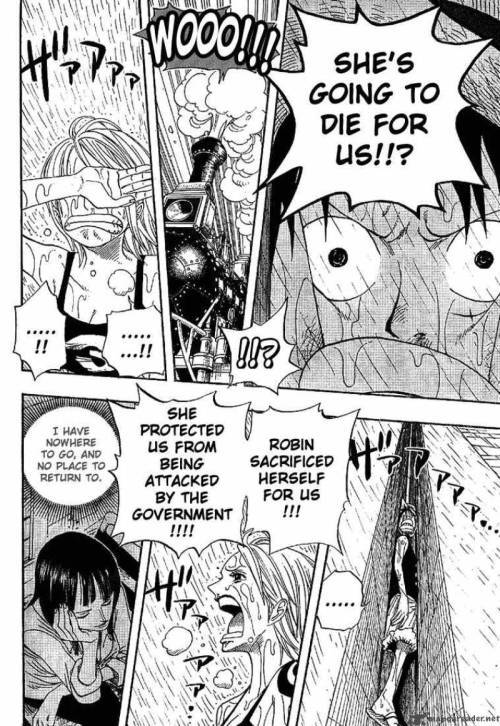
She and displayed the helplessness, frustration, and sadness she truly felt when she got to Luffy.
A smilar scene plays out when we get to Zou. Sanji was taken away, and while Nami seemed ok and even elated at the fact Luffy and the rest are back, is when she's in Luffy's arms that she once again expresses how helpless and anguished she feels...
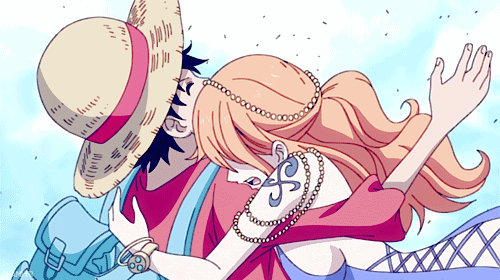
This is how emotional chemistry looks like! It's not about meaningless flattery, flowery words, nor a mere infatuation. It's about growing attached to one another through a strong companionship, mutual trust/faith, offering support/comfort when needed.
Now, true chemistry occurs when characters affect each other in meaningful ways. And Nami also has an effect on Luffy. When Oda wrote the Strong World movie, we get to see how she affects her captain. When Nami got no other choice but leave a message in which she seemingly doubts Luffy's strength and capabilities, Luffy reacts this way...
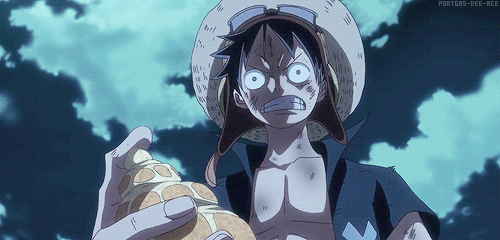
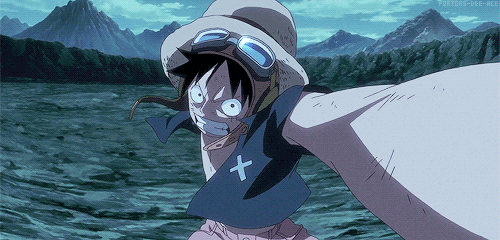
This shows how much Luffy values the perception Nami has of him.
Another perceptive reader explained the difference between this situation and Ennies Lobby. During that massive rescue mission "Luffy is angry at Robin for not worrying about her own safety." In Strong World, the idea of Nami not believing in him is something Luffy takes personal. And as explained in multiple posts, we later learn Nami never stopped believing in Luffy, and the idea of Luffy hearing about it was pretty embarrassing to her.
Well, what about Intellectual Chemistry?
This is a tricky one, because most people think is having a similar level of intelligence. But, even in real life, it's pretty likely potential partners have different degrees of education, so they're not always going to perfectly click or match in this regard.
Then, how people can develop this kind of chemistry under such circumstances? One of concepts of intellectual chemistry is the capability of challenging each other's perspective and beliefs on subjects and matters relevant to both persons.
LuNa fits the second bit, for the greatest challenge each character's perspective has is the other's...
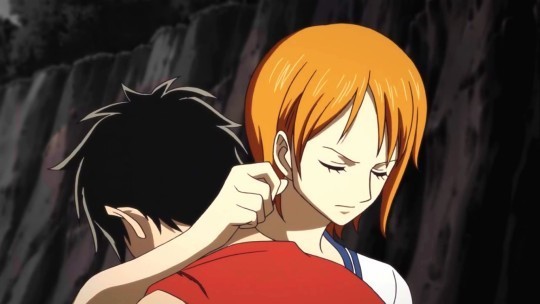
...Nami’s character from the very beginning had a very clear distate for pirates and had trouble trusting others. Her perspective served as not only a contrast to Luffy's idealism, but also as a challenge Luffy and his ideals had to actively overcome. This kind of chemistry covers other aspects that, even people who are not fond of LuNa, could see and mention. For example:
Unlike Zoro, Robin, and others crewmates who, more often than not, go along with Luffy's course of action without questioning their captain, Nami is usually the one who challenges Luffy's decisions. It makes sense given Nami's role, as she herself explained in Weatheria...
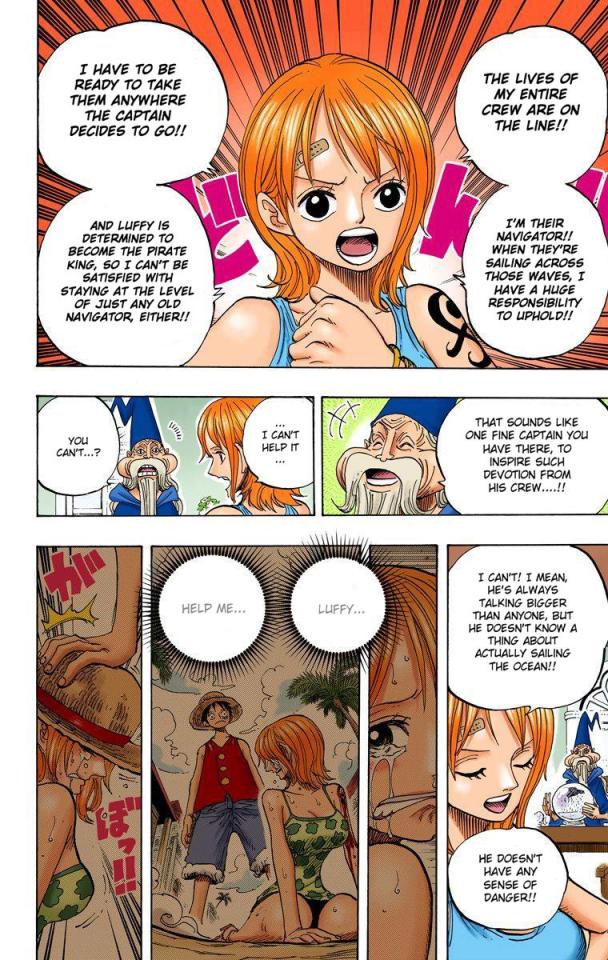
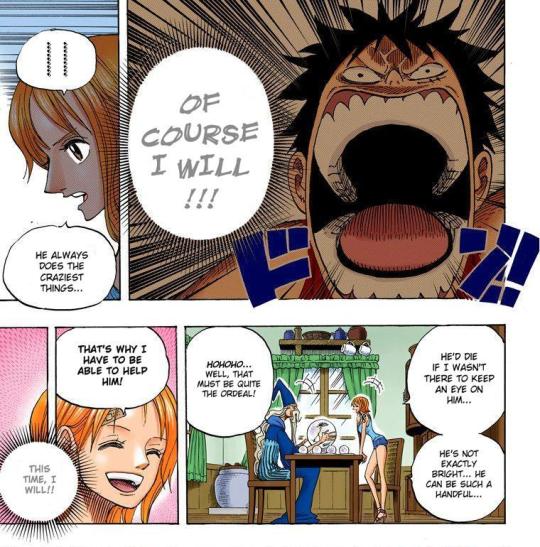
While Luffy is the one who chooses where to go, Nami is the only one can get him where he wants to go. She seeks to provide Luffy with the guidance he needs to survive his journey. She’s the compass leading Luffy towards his adventures.
Now, Intellectual Chemistry not only consists of challenging each other’s perspectives, it’s also about openly discussing each other’s ideas with the right mindset, not because you’re trying to win an argument, but as a mean to learn more about your partner, and as a result, you get to better understand that significant person and both parts work together as a team.
In this regard, it's true Nami is one who questions Luffy the most, but she doesn't actively try to change his mind, instead she attempts to get Luffy to rationalize his choices. And once Luffy voices out his reasons and/or motivations for doing something, she offers her assitance and full support. We see one example in Skypiea:
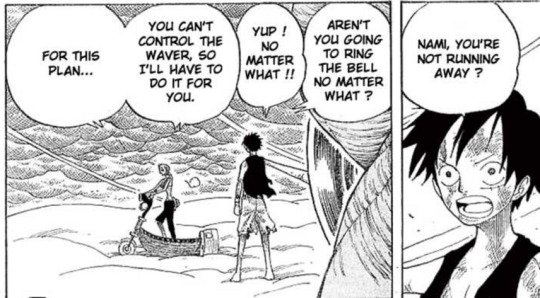
At first, she questions why Luffy is making such a great effort to climb the beanstalk and fight Enel a second time, Nami even urges him to stop and flee with her. She keeps pushing until Luffy clearly states why he's not running away.
Nami could easily run away on her own, but as soon as she understands Luffy’s reasons, she stays, and they’re able to work together to ride the beanstalk so Luffy can finally defeat Enel.
This is not one-sided either. If we go to the Dressrosa arc, we got Nami communicating Luffy her plan of splitting into two teams to keep Ceasar and Momonosuke away from Doflamingo.
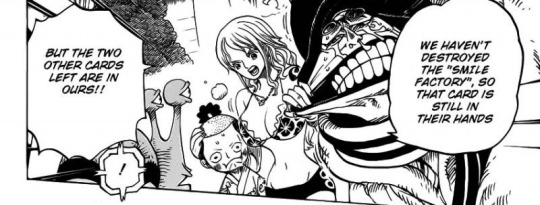
And Luffy not only fully supports her idea, he even follows it up with a mission for the team that stayed at Dressrosa.
Another possible example could be one particular scene from the Zou arc. Luffy’s original intent was going to rescue Sanji on his own...
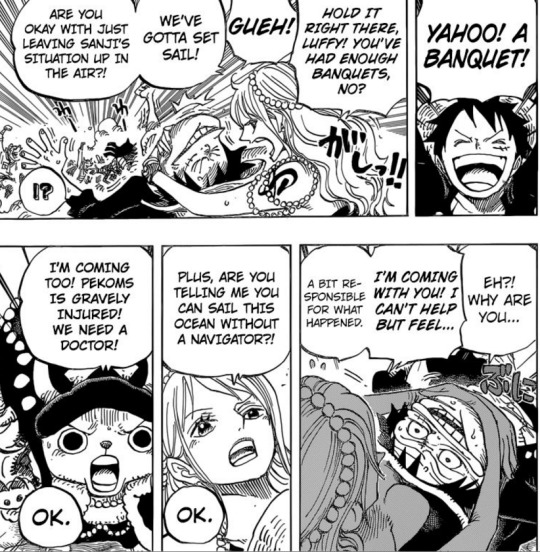
...until Nami reminds him how much he needs her and her navigation skills to keep going. Luffy accepts the reasons she gave him, and alters his original plan accordingly.
We can find other moments to showcase this aspect of their relationship, but to make things short, we can sum it up like this: when their different perspectives clash, they challenge each other’s ideas to the point of gaining a better understanding of each other, and end up acting according to that understanding, they display Intellectual chemistry.
Bonus: Physical Chemistry?
I wasn't going to include this one, but given a japanese fan brought it up ages ago, I decided to leave a couple of scenes that may fit the concept.
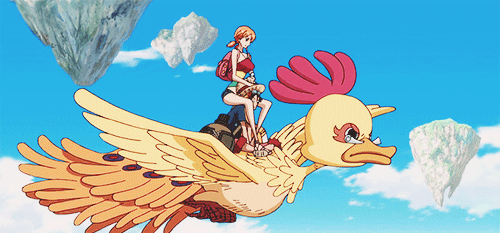
That japanese fan based his comment on Strong World, the movie written by Oda. To make it short, physical chemistry doesn't necessarily means "sex" either, it really comes down to how comfortable a person feels with their partner. However, the details and quirks in this particular kind of chemistry vary from people to people. Just like it can vary from writer to writer.
We often mentioned in this blog certain moment in Fishman Island, where Nami had no problem with Luffy wrapping himself around her...
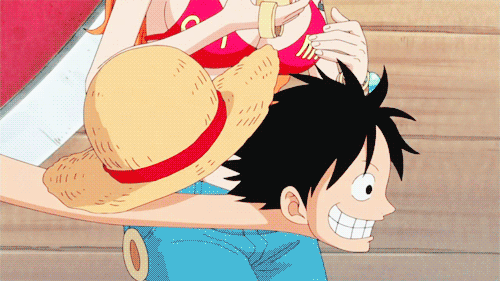
...she indeed bickered with Luffy, but it was about Luffy's wanting to venture through a dangerous route rather than their physical closeness. A nice way to show how comfortable she feels around him. In contrast, she doesn't pull any punches, or thunders, when punishing people for pervying around her. Something that remains consitent even in the Wano arc (at least in the original source: the manga) Regardless of whether or not these count as “physical chemistry,” we can still appreciate how Oda crafted a solid emotional chemistry, and intellectual chemistry as well, in the way he wrote Luffy and Nami.
487 notes
·
View notes
Text
Burning as a Motif for Humanity in Violet Evergarden
I think, when watching Violet Evergarden, most of us picked up on fire as a motif for Violet’s trauma – the violence and destruction she witnessed in the war, and the violence and destruction she engendered with her own hands. I’m not going to go into this too much because it’s all pretty self-explanatory, if not trite, but here are some quick examples of fire as a motif for her trauma just to lay the groundwork for the rest of the essay:
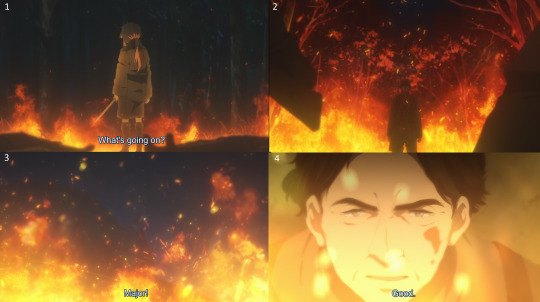
In frame 1 (episode 8), Violet draws first blood on the battlefield, and the once contained fire from the felled soldiers’ lanterns spread quickly through the forest, a symbol for how one small act of violence can cascade into large scale destruction. In frame 2, Gilbert stares at the carnage in front of him, horrified. In frame 3, the major is shot, and all we get to see is a screen of flames. In frame 4 (episode 12), Merkulov stares into a fire as he schemes about re-kindling the war.
I want to follow this (well trodden) opinion up with a more encompassing statement. That is, fire, in Violet Evergarden, is not limited to representing the destructive power of violence and trauma. Instead, it is a motif for humanity itself – an embodiment of the full range of experiences and emotions that make us human.
To show this, I’m going to start off at the beginning of Violet’s journey, focusing on how her disconnect (from herself as well as others) is illustrated in episode one. For instance, her initial struggle to move her now mechanical arms as she sits in her hospital bed in the opening sequence is an excellent embodiment of her dissociation from her own body and lack of agency. I want to, however, focus on two scenes that are particularly relevant for our discussion:
First, the scene where Violet spills tea on her hand:

And second, the scene where Hodgins insists that Violet is burning:

These scenes are similar: in both, someone asserts that Violet must be in pain, specifically due to burning, and in both, Violet rejects that statement. In the first, however, that burning is physical. And in the second, that burning is emotional. Regardless, Violet is so removed from her own body that she is incapable of feeling either. Her mechanical hand is therefore an embodiment of her inhumanity (ie. her “dollness” or “weapon-ness”). Like her, it is cold, mechanical, insensitive, without life or agency. After all, up until now, all she’s been doing is killing on command, without the ability to think for herself, experience her own pain, or sympathize with her victims’ pain.

When the screen shows that Hodgins is indeed correct, that Violet is literally on fire (frame 1), that fire is depicted with restraint. Flames engulfs Violet’s body, but those flames are from a streetlamp enclosed in glass. It is controlled and distant. This encapsulates Violet’s current state; she is literally on fire, but that fire is so compartmentalized and suppressed, and she is so far removed from her own experience, that she is incapable of feeling it.
In frame 2, we are viewing Violet in a flashback, from Hodgin’s point of view. Although we’re offered a close up shot of her bloodied hands, we see, about two cuts later, that Hodgin is actually observing Violet from afar (frame 2.5). This distance demonstrates that he cannot bring himself to reach out to her, something that Hodgin confesses he feels guilty about literally 5 seconds later. They were, at that point in time, and perhaps even now, unable to connect.
In frames 3 and 4, Hodgin is speaking again. We get this super far shot of Violet’s body. The camera is straight on, objective, and unfeeling. This unsympathetic framing has two functions. First, it distances us from Violet. Our inability to see the details on her face and her relatively neutral body language gives us, the audience, no real way inidication her thoughts. Second, it distances Violet from herself. As someone who experiences dissociative symptoms from PTSD, this is a very poignant way of framing what it feels like to be removed from your own experience. Hodgin’s line, “You’ll understand what I’m saying one day. And, for the first time, you’ll notice all your burn scars,” further drives home the sense that Violet is completely estranged from herself. It almost feels like we are looking at her, from her own detached point of view.
We’re going to move on now, but we’ll get back to these frames later in the analysis, so hold onto them.
Throughout Violet’s journey, fire comes up again and again. Specifically, it shows up in moments of emotional intimacy, connection, and healing. Let’s see what I mean by this:

I have here a collection of moments that all occur at the same narrative point in their respective mini-stories: the moment where one character reaches out to another, sympathizes with them, and literally pulls them of their darkness. For example, frame 1 (episode 3) shows Violet bringing a letter from Luculia to her brother. It expresses Luculia’s gratitude and love for him, and ultimately mends their relationship. In frame 2 (episode 4), Violet and Iris share a moment of emotional intimacy and connection, which is the beginning of Iris’ story’s resolution. In frame 3 (episode 9), Violet’s suicidal despondency is interrupted by the mailman, bringing her a heartwarming letter from all her friends. In frame 4 (episode 11), Violet comforts a dying solder by a fireplace.

It’s not that other modes of lighting do not exist – modern looking lamps show up repeatedly in the show. Even Iris’ rural family has them, so I can reasonably assume that, no, the above moments do not all coincidentally use lamps because that’s all there is in this universe; the usage of fire during moments of catharsis is deliberate, and establishes that fire can also bring hope, kindness, and love.
Now that we’ve explored the dual nature of fire as both destructive/constructive, painful/cathartic, let’s go onto the thesis of my essay. Why do I say that being on fire is to be human? Let’s go back to the scene where Hodgin tells Violet she’s on fire (episode 1, on the left), and compare it to the scene where Violet finally realizes that Hodgin was right and that she is on fire (episode 7, on the right):

In these sequences, there is a notable shift in framing and perspective. In frame 1b, we finally get to see Violet’s blood-stained hands from her point of view, as opposed to from Hodgin’s point of view in 1a. Violet becomes aware of her past as an actual agent choosing to kill, shown through the first-person point of view. Similarly, the medium, straight on shot of Violet looking down at her hands (frame 2a) is replaced with an intimate first-person, close-up view (frame 2b). In shots 3a and 3b, the difference in framing is most pronounced. In 3a, we get this straight on, long shot. In frame 3b, the camera’s detachment is replaced by a claustrophobic closeness. While this framing does an excellent job at conveying the panicked feeling of “everything crashing down all at once”, it also demonstrates Violet’s new-found awareness of herself. While before, the camera was used to alienate, now it is used to create a sense of painful awareness and intimacy.
These series of shots are the first in the entire show, I believe, of Violet's body from her own point of view. Their co-incidence with her awakening self-awareness characterizes the state of “being in one’s body” as a precondition to self-connection, or more specifically, to Violet’s understanding of herself as neither a weapon nor a doll, but as a human. Correspondingly, this pivotal moment serves as a catalyst for her subsequent emotional development. From this episode on towards the finale, we’re launched into a heart wrenching sequence of events: Violet’s desperate grieving for Gilbert’s apparent death, her attempted suicide driven by newfound grief, and most importantly, Violet receiving her first written letter, an act that is strongly representative of genuine human connection. Following these events, Violet’s emotional connection to both herself and others only continues to grow; during her two final jobs of the story, she breaks down crying in response to the suffering of her clients, demonstrating a level of compassion—if not empathy—that she seems to have never been able to tap into before.
At the same time, Violet acquires a new sense of agency, making plot-driving decisions that no longer require other characters’ validations. Most poignantly, in episode 12, she chooses to stay on the train to fight Merkulov, explicitly going against Dietfried’s order for her to leave. Her reason?
She doesn’t want anyone to die anymore.
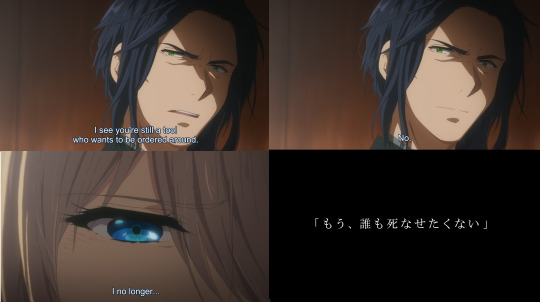
And it’s this moment, for me, that consolidated her as a character with true agency. Up until now, all her major decisions have been framed in relation to Gilbert: she killed in the war because Gilbert ordered her to, and she became an Auto Memories Doll because she wanted to understand Gilbert’s enigmatic “I love you”. Now, however, her motivation is purely her own—she fights, simply because she doesn’t want anyone else to die. It’s a line implies an intimate knowledge of loss. It’s a sentiment motivated by compassion. It’s a raw and extraordinarily human thing to say.
When Violet embarks on her journey to decipher Gilbert’s love, she is devoid of many traits we consider inherent and possibly even unique to being human—suffering, compassion, altruism, love, agency, and the interplay between them. As an Auto Memories Doll, she learns to live, experiencing all these emotions she had never had the luxury to experience before, and we quickly realize that she cannot know what love is without simultaneously wrestling with her trauma. She learns that yes, sometimes the fire destroys and sometimes it burns, but sometimes it thaws too, and you cannot have one without the other. You cannot choose what the fire does to you; you cannot choose what you want to feel. Thus, to be on fire is to know the anguish of its destruction, but it is also, and more importantly, to know the catharsis of human connection, to be the warm flame that pulls someone else out of the dark, to be pulled out of the dark yourself. To be on fire is to be human.
#violet evergarden#violet evergarden analysis#anime analysis#anime#anime essay#anime meta#violet evergarden meta#analysis#w.writing#w.analysis
55 notes
·
View notes
Text
Alright. I've written tons of drafts trying to capture my thoughts on this.
Aromantic people, I'd love to have a discussion about this either in reblogs or DMs or whatever.
I don't know if I'm on the aro spectrum. Ever since I saw the word, I kind of felt like it described something in me. When I saw it, I was coming out of a difficult yet amicable divorce, was thinking I was a lesbian and not bisexual or pansexual... the works. The whole time I felt so cold. My ex husband, when I first told him, he was more blindsided than I expected. I didn't like how much he wanted me to change for him. To be honest, I had been hiding a lot of aspects of myself for years, not only from him, but from just about everyone. To see him be so upset, I felt like I was just... cold. I thought he would be happy for me for finding myself. And it wasn't like I wanted to leave him forever. It wasn't like I hated him; I still saw him as my friend, one of my only supporters since coming out as pan/bi. We had never had sex and we didn't do many romantic things for the whole of our relationship. He wasn't great at planning fun stuff like that, and while I was creative and could absolutely emulate what I thought a "romantic" relationship looked like... I actually valued his companionship more than what he could offer me sexually or romantically. Heck, even before we got married, I described our relationship as a companionship, rather than a sexual or romantic tie. Yes, I have a history of religious shaming, so there is an aspect of that on the sexuality note, but I know I experience sexuality in my own way.
As a people pleaser, I also struggle with emulating what I think is right or expected of me. I am very creative, a great actor, and selfless to a fault. I can convince myself of things quite easily and create a passion based around that as long as it involves creativity and a fool-proof plan. Church and religion was easy for me because of my environment. As soon as I left that environment of constant reinforcement... it fell apart.
So with that said... I think I might be aromantic, or at least on the spectrum. It's been confusing for me because.. I also kind of like romance. Of course I would want that for myself in theory. All the movies portrayed it as so very nice. I've had crushes on people plenty of times, mostly unrequited. I mostly wanted my romantic relationships to save me and take me away from my oppressive home life, which stifled my sexuality down to nothing. I had no freedom of expression in that area, including in my gender. And as soon as I left that environment, again—boom. Within a year I knew I was attracted to women/afabs and that I was non-binary. That's not a coincidence.
I like the idea of being with a partner. I like the idea of partners. So I cling to that in real life, in my relationships. It feels like a compulsive behavior though. As soon as it happens, as soon as someone likes me, something in my brain just clicks off, I disregard my family, friends, or even myself, all to fit perfectly into a role, probably in order to protect myself (either from being abandoned or from being alone—even though I'm not alone). When someone likes me "like that," I have this glimmering hope of being seen in a sexual light. That amount of emotional constipation for years upon years of my life has built up and become something that, when met with even the slightest bit of compassion or friendliness or potential for acceptance, comes out with the pressure of a fire-hose.
It is uncomfortable. For others, and for myself.
I'm not saying it's wrong for me to want to experience that acceptance that I largely did not in my childhood and teen years. Of course everyone deserves to feel loved and accepted for who they are, including their sexuality.
But this perspective also has me wondering how much of romantic attraction is conditioned? I'm not exactly romance-averse, obviously. But I do like to do romance differently in a lot of ways. I would love to see how I would do without my trauma-driven compulsion. I imagine now that if I didn't have that issue, my relationships would just be friendships, or friends with benefits even. No huge romantic anxiety. And in a way, hearing other aromantic people describing how they feel doesn't come off as different from how I feel. The only difference is this compulsory romantic action of mine. Without that, I feel extremely close to aromanticism in practice, not just in theory. (I've legit had people ask me on dates now as an adult and I don't know if I would really say yes except to have a friend, not a sexual or romantic date.) I have trouble separating friendships from romantic feelings, I struggle separating romantic gestures like touch from friendship normalities. I can tell the difference between sexual and platonic feelings. But Christianity really did a fucking number on me, which is where I think half of this grief even comes from to begin with. I know I'm polyamorous and I love to spend time with lots of people at once and not worry about being somehow wrong for loving lots of people. I know aromantic polyam people exist.
(I swear to god the more I explore myself, the more pride flags I end up with and I'm starting to get annoyed 😂)
Does anyone have a similar story to this one? I've seen only one other person who described something similar. I've always felt that the kind of romantic feelings I felt were more the result of obsessive conditioning than they were my own will. And that conditioning started so so young, no doubt. I know I'm not happy with this compulsory behavior.
Does this sound like an aromantic story? What is romantic behavior? How is it even different from friendships? And do you think hyper-romantic behavior is naturally occurring in humans? Do you think it's radicalized by consumerism? Is it entirely fabricated by consumerism?
(My natural state is being tired, depressed, wanting to paint/draw, and wanting hugs—I only want hugs because I have been touch-starved all my life due to the Church's teaching of "touch = sexual and sexual = bad")
34 notes
·
View notes
Text
Indigo De Souza Interview: Compassion for Different Modalities
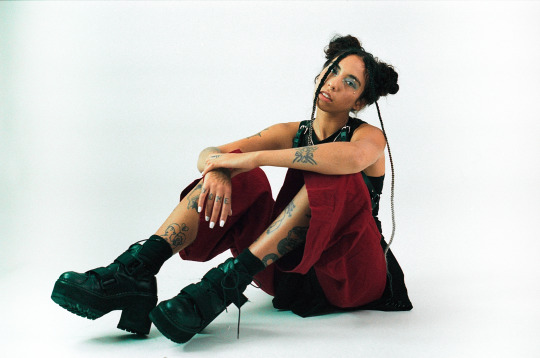
Photo by Charlie Boss
BY JORDAN MAINZER
Calling from her home near Asheville, North Carolina earlier this month, singer-songwriter Indigo De Souza is getting ready to go on tour behind her terrific sophomore album Any Shape You Take (Saddle Creek). Like everyone, she’s anxious about navigating the current COVID-19 landscape, but how she and her band adapt to a live performance and play the multi-dimensional songs that make up the record seems to be of little concern. I guess if I was as talented as De Souza, I wouldn’t be worried, either. Released last month, Any Shape You Take is a stunning series of ruminations on love and relationships, platonic and romantic, that span a number of years in De Souza’s life. Raised in a conservative small town in North Carolina by a mom who was an artist, De Souza doesn’t shy away from the fact that her family did not fit in. At the encouragement of her mother, she leaned into her artistic visions, making music as early as 9 years old, releasing her first EP in 2016.
After self-releasing her (very appropriately titled) first album I Love My Mom in 2018, De Souza signed to indie stalwarts Saddle Creek, who rereleased her debut and supplied her with the means to craft a much larger-sounding follow-up. Working with prolific secret weapon co-producer Brad Cook, her first proper label release occupies an incredible amount of genre territory. “This is the way I’m going to bend,” announces De Souza on auto-tuned synth pop opener “17″ before, well, bending in a number of different directions. “Darker Than Death” and “Die/Cry”, nervous songs that were written years ago, sport fitting build-ups, the former’s slow hi hats and cymbals giving way to jolts of guitar noise, the latter’s jangly rock taking a back seat to yelped harmonies. Songs like “Pretty Pictures” and “Hold U” reenter the dance world, the latter an especially catchy neo soul and funk highlight, a simple earworm of a love song. In the end, whether playing scraped, slow-burning guitar or rubbery keyboard, De Souza’s thoughtful and honest meditations center the emotionally charged album, one of the very best of the year.
De Souza takes her live show to the Beat Kitchen tonight and tomorrow night (both sold out) with Dan Wriggins of Friendship opening. Read our interview with De Souza about the making of Any Shape You Take and her songwriting process.

Since I Left You: On Any Shape You Take, there seems to be a good mix of folks you’ve worked with before and folks you’re working with for the first time. What did each group bring to the table?
Indigo De Souza: Brad Cook was co-producing. It was my first time working with a producer on something. That was crazy. He was very supportive of everything and very encouraging. It was nice to have someone to bounce ideas off of who wanted to encourage my vision. I also worked with Alex [Farrar] and Adam [McDaniel] from drop of sun studios in Asheville. They’re both just so sweet and talented. They were engineering but also helped with production as well. I ended up getting really close with Alex, and me and Alex finished out the album together doing vocal overdubs and random overdubs. It feels like he did a lot of production on the album and was a star for me in the process. They were all great to work with. It was interesting to me to have so many people working on the album.
What I realized after the fact, [though], was that it was kind of distracting for me to have so many brains working on it. It taught me I actually feel very confidently about my vision for songs, and I can trust myself to have ideas for my own songs. I think I was scared going in that I was going to come up blank in that scenario because it was such a high-pressure thing, getting on a label and making a high-production album. But I definitely thrived in the space. It was really fun.
SILY: It shows in the finished product. There are so many different styles and subgenres within the record. Do you listen to all the types of music that show up on this record?
IDS: Yeah, for sure. Mostly, I listen to pop music and dance music. That’s probably my most daily genre. I don’t listen to a lot of music daily, though. I listen to music probably a couple times a week when I’m in the car, but it’s so random, and the genres I listen to are pretty random. It depends on my mood. I think when I’m writing, it’s the same way, whether I’m writing a poppier or rock-based song. They’re different moods for me.
SILY: How do you generally approach juxtaposing lyrics with instrumentation?
IDS: With writing, it’s different every time the way they fall into place together. I do notice that one of the more common ways it happens is I’ll be going about my day and hear a melody in my head and start humming it and realize I’m making it up, that I have no record of it before. I’ll start attaching feeling to the melody, depending on what I’m feeling, and at first I’ll be singing gibberish with the melody, but I’ll usually get some headphones on and plug into the computer so I can sing into a microphone. I’ll mess around with the melody and sing random words until something true to me kind of sticks. That’s usually how it goes. Sometimes, I [do] sit down and it comes out in one breath, like the song is already written in my mind.
Honestly, it’s so normalized how songwriting is. It’s such a strange, magical thing that people can write songs that have never been written before. [laughs]
SILY: Thematically, there are a lot of songs on Any Shape You Take where you’re feeling doubts about a relationship, like on “Darker Than Death”. Someone’s feeling bad, and you’re wondering whether it’s you making them feel bad. And on “Die, Cry”, you sing, “I’d rather die than see you cry.” On the other hand, there are some songs like “Pretty Pictures” where you know your place more within the relationship, and you know what’s eventually gonna happen to it. How do you balance those feelings of doubt with knowing what’s gonna happen?
IDS: It’s funny, because the first two songs you mention were written a very long time ago when I was in the only very long-term relationship I’ve ever been in. I was very confused in that time and was having a hard time in general with my mental health. “Pretty Pictures” is the newest song on the album, a last minute addition because another song we had on there didn’t really fit. We looked through my demos folder and chose “Pretty Pictures”, the most recent song I had written at the time, and recorded it for the album. They’re totally different times in my life, and how you said it is definitely how I was. There’s a time I was more confused, and now, love is more simple in my life, and I can process things and see how they are, have compassion for different modalities.
SILY: I love the line on “Way Out”, “There are no monsters underneath your bed, and I’ll never be the only thing you love.” It’s a very logical statement in the face of unbridled emotion that can make you think illogically. Is that contrast something you think shows up throughout the record?
IDS: Within love, over time, I’ve realized that there’s not one person for anybody. There’s a lot of fluidity in the ways people can feel towards other people. That line is definitely a nod to allowing people to love many other people and not taking it personally.
SILY: From a singing perspective, you have a lot of different vocal stylings on the record. I found it interesting you led it off with a track where you’re super auto-tuned. Can you tell me about that decision?
IDS: “17” originally was this demo I made in 2016 or 2017. It was a very old demo. In 2018 or so, I brought the demo to my band at the time, and we created a live version of that song that was nothing like the recording that you hear. The recording was so weird and had a lot of auto-tune and higher-pitched and lower-pitched vocals. We had a live version we played for a while that’s on Audiotree. Whenever we were recording Any Shape You Take, we started to record it the live way and realized it wasn’t feeling right. We listened to the old demo, and it gave this wake up kick to everyone. We got excited by how the demo sounded because we hadn’t heard it in so long. We realized we wanted to record it based on the demo. So that song sounds very similar to the way the demo originally sounded.
SILY: What’s the story behind the album title?
IDS: There are so many layers to the album title. [laughs] It came to me mostly because the album takes so many musical shapes but also so many emotional shapes. It feels like a lot of the themes in the album are about change and acceptance of change and acceptance of a full spectrum of feelings of pain and grief and allowing people to take many forms. It was mainly inspired by the fact that I’ve taken so many forms in my life and am witness to the way changing forms yourself can either push people away or pull them in closer. I’ve always been so appreciative of the people in my life who allow me to take so many different forms and are still there to witness and care about me, whether we’re close to each other or far away. That’s the main reason I wanted to call the album Any Shape You Take. The most beautiful kind of love you can have is allowing someone to be themselves and shift in and out of things freely.
SILY: Is your live show faithful to the studio versions of the songs, or did you have to learn how to adapt the songs to the stage?
IDS: A lot of them sound very similar to the recording. We’ve been having so much fun practicing them and playing them live.
SILY: Is there one in particular you’re most looking forward to playing?
IDS: I love playing “Bad Dream”. That’s just a crazy song to play live because it’s so loud and rowdy. [laughs]
SILY: You have that falsetto in the middle of it, too.
IDS: Yeah. It’s so fun.
SILY: Anything you’ve been listening to, reading, or watching lately that’s caught your attention?
IDS: I’m excited that one of my favorite authors, Tao Lin, just put out a book I haven’t been able to get fully into. It’s called Leave Society. I just got it in the mail last week. Other than that, I’ve just been so, so busy with interviews and work on the computer and with my manager, staying on top of this crazy shift happening on top of my life. I haven’t taken in a lot of media. I was just watching Love Island recently because I wanted to shut my brain down. Somebody was telling me about Sexy Beasts last night, which sounds insane. I’m excited to watch that.
youtube
#indigo de souza#interviews#live picks#saddle creek#beat kitchen#dan wriggins#wluw#drop of sun studios#any shape you take#charlie boss#i love my mom#brad cook#friendship#alex farrar#adam mcdaniel#audiotree#tao lin#leave society#love island#sexy beasts
2 notes
·
View notes
Photo
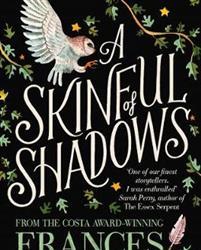
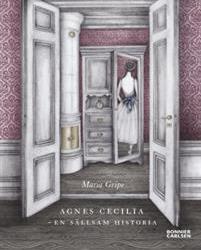

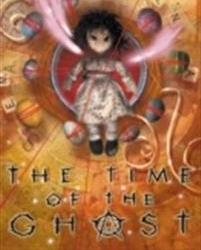
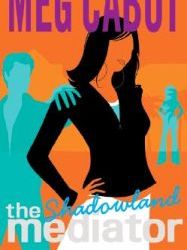
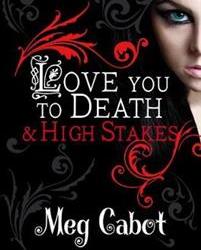
Five non-horror YA books featuring girls and ghosts
1. A Skinful of Shadows by Frances Hardinge
Explaining this book at all kind of spoils it, because we start off with the protagonist not really knowing anything, but to spoil it just a little bit:
It's set in 1650s England, and starts off in a judgemental Puritan town where a girl called Makepeace is living with her mother, at the mercy of her aunt and uncle. She frequently has nightmares, and her mother tells her to stop dreaming like that and learn to defend herself.
As it turns out, this isn't just mindless cruelty from her mother's side. Makepeace has the power to take ghosts into her body, which is both dangerous and highly exploitable (which makes it even more dangerous). In short, pretty soon, bad shit happens.
This is the kind of book where I couldn't tell at all where it would go, but once I was finished, I looked back and went, "Ah, yes, that's the shape of the story!" I.e. the best kind of book. It's rich and complex, with philosophical and social aspects, and eventually a fair bit of action. It also set the scene very well, featuring a part of history I wasn't previously very well acquainted with.
I could spend a long time analysing it, but it really needs to be experienced firsthand, so I'll just say, read it!
2. Agnes Cecilia by Maria Gripe
This book is immensely well-known to Swedish women 30+ and not many others (though it has been translated to English, Spanish, and other languages). As a librarian, to this day I find that a lot of Swedish ghost stories written are attempts to recreate Agnes Cecilia.
Nora moves into a new apartment with her foster family and soon encounters ghostly signs, which become more pronounced when she's given a doll from a mysterious unknown person. She comes to realize that a previous inhabitant of the house is trying to contact her.
There's a very magical realist feel to this book. Nora is never frightened of the ghost, just frustrated that it's so hard for the living and dead to communicate that she doesn't always know what it wants.
At its core, this is a story of abandonment, and of adults refusing to acknowledge the child's perspective. It's rather tragic, though it has a happy(ish) ending, and there are many moments that I find heart-wrenching.
One particular example is when Nora thinks back on how her parents died and no-one told her, instead lying that "Mom and Dad have gone on a trip." In order to find out anything at all, she had to quench her grief and pretend that she didn't know, and when, years later, her relatives finally admit the truth and expect her to mourn, she can't show the "correct" feelings, and is dubbed heartless. It's one of the most hard-hitting scenes of adultism I have ever read.
But it's also a very warm and tender story, and while it's hard to call the ending happy, it does show that the circle can be broken and lonely people find each other.
3. The Canterville Ghost by Oscar Wilde
Much, much jollier (and shorter) than the others, though not without sentiment, this classic still works surprisingly well! It's easy to recognize the humour of a ghost that's trying to scare a thoroughly practical modern family and has to deal with prankster kids, an older son who insists on removing ghostly blood stains with Pinkerton's Champion Stain Remover, and parents who helpfully try to oil his chains and feed him medicines.
The daughter of the family, Virginia, isn't as cheerful as her family when it comes to haunting matters, and so when she meets the ghost, the story takes on a more somber note. No doubt Sir Simon is a very wicked ghost, but through Virginia's eyes, we still feel some compassion for him, and so by the end, it's more than just a romp.
4. Time of the Ghost by Diana Wynne Jones
DWJ is my favourite author; of course I was going to include her! This story is a bit different in that the protagonist IS a ghost... kind of. She's not quite sure WHAT she is, but by haunting a certain house, she comes to believe that she's one of the sisters who live there, although she doesn't know which one. Her memories are muddled to say the least, and the ghost knows that the girls are about to do something truly dangerous, but she may not be able to figure out what, or how to prevent it.
While there are definitely some creepy moments in this book, it's yet another story of children faring ill, and as such it may be more upsetting than any of the others. It has been said that this is the most autobiographical of DWJ's books, and the parents are neglectful to say the least. The sisters aren't always too kind with each other either, but when push comes to shove, they do stand up for each other when it counts.
This book does feature a malevolent spirit (though that's not the titular ghost) and if you're easily scared you may want to read it in the daytime. :-)
5. Shadowland/Love You To Death by Meg Cabot (first in the Mediator series - the titles are different in the US and UK editions)
Again, this is the story of a girl who moves to a new town and discovers some ghosts - the difference is that Suze in these books isn't the least surprised by that fact. She's a mediator, a person with the special ability to talk to ghosts and occasionally get rid of them. Since she can't tell people around her what's going on, she has a reputation of being a "bad" kid, but as it turns out, the priest at her new school is also a mediator and can mentor her, though he sometimes disapproves of her methods.
It's all very Buffy, but with a somewhat fluffier touch (written by the same author as the Princess Diaries series). The romance is also a bit more pronounced, as one of the first ghosts Suze encounters in her new environments is Hector "Jesse" de Silva, who was murdered as a teenager way back in the 19th century. Their dynamic is very sweet, though it sometimes falls into the trap of "Why is he so aloof? Does he only want to be friends?" No, Suze, he's being responsible about the fact that he's 150 years old and also dead. But that's a minor gripe.
The rec is for the first book, rather than the whole series, because I'm not too fond of the last few volumes, which I felt were trying to go dark for the drama and lost much of the charm. But do start off with the first and keep reading for as long as you enjoy them!
#halloween#book recs#ya literature#frances hardinge#maria gripe#oscar wilde#diana wynne jones#meg cabot#a skinful of shadows#agnes cecilia#the canterville ghost#the time of the ghost#shadowland#love you to death#the mediator
22 notes
·
View notes
Text
You Spin Me Right Round...
I’ve never written a meta post about an episode before, so with only three episodes left, I figured this is the perfect time to start. It typically takes me a few days to process and gather my thoughts, because much like Dean this season, I’m rather slow on the uptake. By the time I have something to say, it usually feels like the moment has passed. But what the hell. We’re three episodes from the end and I have FEELINGS.
To start, I’m going to back up a moment and talk about 15X16 (see “slow on the uptake,” above). Lots of fans, myself included, found themselves frustrated with watching what at first glance seems to be your run of the mill MOTW episode. A *good* MOTW, for sure, but still, with only four episodes left to go, it felt like we should be past this by now. In fact, “aren’t we past this?” seemed to be the theme of the entire episode and that alone should have clued us in that despite appearances, this episode was anything but just another MOTW. If that was too subtle, Billie’s pointed “you’re working a case? Now?” should have been a dead give away that we needed to look deeper. And many tried, but the most a lot of us could come up with was the brothers’ big emotional argument at the end and even that was a giant moment of “been there, done that.” Why at what should be a pivotal point in the series are we rehashing the same arguments we’ve been watching for the past 15 years?
Jumping ahead to 15X17 for a moment, we see Dean absolutely breaking down. He’s losing it. Imploding. Leaving aside all of the problematic comments about and to Jack (we’ll come back to that), Dean lays out the crux of the problem when he and Jack are talking in the Impala: he doesn’t know what’s real. Like he’s been saying all season, he’s lost the perspective to be able to tell what about his life has been his choice and what has been Chuck’s machinations. He’s stuck in Chuck’s hamster wheel. Going ‘round and ‘round. Repeating the same scenes, lines, hunts, and arguments on a loop. Wait…why does that ring a bell?
Back to 15X16 and NOW it makes sense. Why are we stuck in yet another MOTW episode? Why is Dean lying to Sam again? Why is he once again sacrificing someone he loves, leading them “into the meat grinder?” Why is he backsliding on all that great emotional growth we saw last season? Why is he repeating the same destructive patterns that thanks to Kaitlyn, we know he’s been stuck in since childhood? IT’S THE HAMSTER WHEEL. Round and round we go…but whose hamster wheel is it?
Back to 15X17, LOTS going on in this episode and I’m not going to touch on all of it. But some highlights [and these are in no particular order because 1) I’m scatterbrained as hell and 2) the fuck does it matter anyways, because as we’ve established, we’re just going around in a big ass circle here]:
We see some absolutely masterful manipulation by Chuck. Manipulating Dean in order to manipulate Amara because he knows thanks to their “bond,” she’ll never turn on Dean…unless he betrays her first…which brings us to two of the biggest points in this episode. First off, we learn that Chuck didn’t write the Dean/Amara bond, which, as many more brilliant meta minds have pointed out before me, mirrors Dean and Cas’ profound bond, which we learn at the end of the episode was also NOT written by Chuck (and in fact pisses him off quite a bit, to put it mildly.) This reminds us that though he claims to be omniscient, Chuck is definitely NOT omnipotent and while he may be able to control space and time, one thing he can’t control is human emotional bonds and relationships. And this friends, this is important. In fact, it’s everything.
Right before Chuck confesses that Castiel is, as Cas fans have long insisted, the very embodiment of free will (more on that later), Sam references Eileen, which, yes, is very sweet, but also...also, is a call back to their relationship, specifically, to Eileen’s fears that her feelings for Sam weren’t genuine. She wonders what about her and Sam’s relationship was real and what was Chuck, which we knew at the time was a mirror to Dean’s “What about all this is real?” The answer, of course? “We are.” And now we have confirmation: emotional bonds/relationships are REAL. They might be manipulated by Chuck, but they aren’t created by him and clearly, he can’t understand them. That’s illustrated several times in this episode. His reaction to Dean’s “icky” bond with Amara. His inability to "feel the love" of the angels she took him to see. His cold manipulation of his sister. The throwback to the way he threw Adam and Eve, his first human children, out of the Garden and then used their sons to further his own plans. His consternation with Castiel for not doing as he was told after he raised Dean from perdition.
Chuck doesn’t understand and didn’t create emotions. Which seems obvious wen you think about the fact that his first sentient children didn’t have them. Emotions are a specifically HUMAN creation and that is what makes humans so frustrating and incomprehensible to Chuck. It’s why he hates them. Not only are a few of them very disobedient pets, as a whole they've created something he cannot. What a blow to the ego that must be.
The second thing referenced by Amara and Chuck’s conversations about Dean is his betrayal of her. Chuck’s telling Amara that Dean is sending her to the “meat grinder” is not a coincidence. That language is a deliberate mirror to Dean accusing his alternate future self of sending Cas to the meat grinder in The End (That’s only one of several parallels Unity makes with The End. For a much more thorough accounting, check out castielslostwings’ Twitter thread.), which, as I referenced above, also parallels Dean’s willingness to send Jack on a suicide mission. What do these things all have in common? Each time, Dean is ignoring his own instincts, his own “moral compass,” in favor of a plan. In The End, he regrets his choice to say no to Michael…to veer from Michael’s, aka God’s, aka Chuck’s plan and is trying to recreate it by killing Lucifer/Sam. Now he’s following Billie’s plan, even though it clearly feels wrong to him. We can see that in the way he tries to distance himself from Jack. The way he tries to convince himself that Jack isn’t family. That he’s different from Sam and from Cas, even though he’s told Jack before that he IS family. Even though when he was angriest with Jack and distraught with grief over Mary, he still told Belphegor that Jack was “our kid.” We can see it too in the way he reacts equally defensively when Sam brings up how they’re about to betray Amara in 15X15 and again in 15X17 when we can see Dean flinch when she tells him they’ll always help one another. This feels wrong to him, but he’s doing it anyways because he thinks he has no choice.
Looking back over seasons’ past, the two ever-present themes in Supernatural have been free will (obviously) and found family. They’ve always been intertwined. We’ve watched time and time again as Sam, Dean, and Cas choose one another. But now we have those two themes coalescing more than ever before. Every time any of them chooses “the plan” over their family, shit goes sideways. And now we know it’s because, as Chuck has made pretty damn clear in his manipulation of Billie’s plan, he’s omniscient and he controls all time and space. All plans are HIS plan.
But what doesn’t he control? Emotions. And the bonds they create between people. It’s in choosing one another that Team Free Will has always thwarted Chuck’s plan. Dean refusing to go down the path laid out for him in The End. Cas refusing to "hurt Dean Winchester." Sam refusing to reap MoC Dean. Dean refusing to shoot Jack in that cemetery. The boys refusing to hurt one another, again and again and again. The boys choosing one another again and again and again. And I think that's what Chuck really wants to break. Why he's so obsessed with getting his ending. This is what Becky was getting at in her critique of his story. Chuck doesn't understand his characters, because he doesn’t understand feelings. He hates this creation of humanity that has become more important to them and more defining of them than anything else, including him. So, he wants to conquer it. He wants to manipulate the situation to make his characters choose something of his divining over their emotional bonds to one another. Those bonds he didn't create and that he, in all of his omniscience and power, cannot sever.
15X17 confirms that free will is real. Cas chose to disobey. That wasn’t written by Chuck. And speaking of Cas, let’s look at our biggest two parallels of the season: Dean and Cas. (Sorry Sam. Sit this one out.) Cas, who Chuck has just identified as the epitome of free will. Cas who, once a mindless soldier, abandoned heaven’s plan. Who found his new purpose when he chose to become a father. Who follows his instincts over the plan because “something went wrong” and “the plan changed.” Versus Dean. Dean who has spent this entire season feeling trapped. Who keeps choosing “the plan” over his family and finds his cage getting smaller by the minute.
Back to 15X16. I asked before whose hamster wheel is Dean on? Dean says it’s Chuck’s, but that assumed that free will was a lie. Now we know it’s not. Free will is real and Chuck never even had to take it away from Dean. Dean gave it up as soon as he started following someone else’s plan instead of his own. Dean’s hamster wheel is of his own making.
There are so many more things I could say about 15X17. For starters, those chapter titles…are they referencing Chuck’s story? Or are they chapters in his death book, the one we saw in this episode and Chuck himself referenced? After all, Billie’s read that book, so she must have known “her” plan would fail. But she went down that path anyways…And speaking of Billie, I haven’t even touched on her or the Empty. The Empty says Billie wants “everything back where it belongs” with angels in heaven and demons in hell. Wait. That sounds familiar. Oh yes! My new favorite demon, Zack, said that in our other most recent “just a MOTW” episode. It seems Rowena wants something similar. Isn’t that interesting? And speaking of Rowena, if there’s one thing this show loves, it’s duality. Parallels. They’re everywhere…except, it seems, when it comes to the queen of Hell. Who will mirror Rowena? How interesting that we visited that empty throne room in Heaven last week…
BUT…the main thing here is this: Unity. This episode was about unity and now we have a unified Chuck and Amara. We’re going to need a unified TFW in order to defeat them. Because that is the key to defeating Chuck. Choosing one another…choosing our found family, the ones we’ve created those bonds with…again and again and again.
19 notes
·
View notes
Note
Hello there! Could you maybe put together small SW novels recommendation list? You reference books often and I assume you can suggest a few good ones that shed light/give more insight into the Jedi culture. Thank you for your blog and have a good day 💗
Thank you! I hope you have a good day too.
I actually haven’t read that many Star Wars books, all things considered - there are a lot, and I’ve barely scratched the surface of the prequel era stuff, let alone the rest of the franchise. I only recently started getting into the books, and there’s probably a lot more really good ones out there that I just haven’t had the chance to get to yet.
What I could do is go through what I have read and give my opinions on those. So far, in no particular order, I’ve read:
- The novelizations for the prequels and some of the original novelizations for the OT. More on my thoughts on those here (and specifically for the ROTS novelization here), but in summary: TPM novelization is a bit weak, AOTC novelization is decent and really helped sell the romance to me in a way the film fell flat for me, ROTS novelization is nothing short of phenomenal, ROTJ novelization is also pretty good, I don’t remember the ESB novelization enough to say anything on it, and I never read the ANH (or technically just Star Wars) novelization. I’d say they’re worth checking out at least once.
- Shatterpoint. I really like this one, it deals a lot with Mace struggling with the dark side, and it captures the idea of falling to the dark side as something rooted in defeatism, which really resonates with my interpretation. There’s quite a bit of discussion of Jedi philosophy and why they do and believe the things they do (or at least how Mace Windu sees it) - I’ve cited it before in my meta because I think it lays out pretty well why they resist the dark side. It also deals a lot with the costs of war - especially psychologically. There’s also a decent element of Jedi as family through the father-daughter relationship of Mace and Depa. On top of all of that, it’s very well written (same author as the ROTS novelization). I strongly recommend this one, though be warned that it is a very heavy, brutal book - oh, it’s not completely bleak, and it has it’s moments of humor, but it is not a happy story. It ends in victory, both in the immediate situation, and with Mace coming to terms with some of what he’d been struggling with, but I wouldn’t call it a happy ending, more that…well, as Mace says, he’s the last one standing.
- Yoda: Dark Rendezvous. I read this one most recently, and I made a long post on why I absolutely loved it. It’s not perfect but I think it’s the best portrayal of the Jedi in the books that I’ve come across so far - this book really goes hard on the “Jedi as family” idea, which I love, and there are really good conversations on (and inspiring examples of resisting) the dark side, and working through but not giving into grief. Everyone should read this book, it shows the Jedi as an inspiring people with so much tenacity and compassion, doing their best. And it eviscerates every bit of nonsense about the Jedi (and especially Yoda) being “emotionless” or “loveless”- it’s full of amazing passages that are absolutely perfect responses to these notions, direct refutations of them even (as well as refutations about the idea of the dark side having any kind of merit at all) because they get slung around in the story by a lot of the characters. If I could only pick one Star Wars book to suggest someone read, it would be this one, absolutely.
- Kenobi. Do you like Westerns and a sad Obi-Wan with a chronic hero syndrome that doesn’t help him with the whole ‘staying under the radar’ thing? If yes, you will probably like this book. It doesn’t really get much into Jedi culture, since…well, they’re dead, and most of the book is written from an outside perspective, not Obi-Wan’s. I think that was a good choice, because while he’s understandably going to be very sad during this time (it takes place during his very early days on Tatooine), constant exposure to that, in my opinion, would overdo it and wear out the audience. So the outside perspective of how sad and weird he is, where the characters don’t understand the context behind his behavior, but the audience does, works really well. I have some issues with it - for instance, while it’s kind of hilarious how much everyone wants to jump his bones in this book, I do wish that they’d kept the chemistry between Obi-Wan and Annileen strictly platonic (and the language around romance in this book rubs me the wrong way). And how people find out his last name is a bit contrived. But it’s a decent read that I’d recommend.
- Jedi Apprentice (series). I’d recommend this with the caveat that you have to go into it keeping in mind that it’s written for younger readers. Which absolutely does NOT mean it’s all fluff and sunshine and rainbows, very far from it (I call this series “Obi-Wan Kenobi’s Collection of Childhood Trauma” for some very good reasons, and the fact that he tries to sacrifice himself to suicide-bomb a door open with the slave collar wrapped around his neck before he even gets taken on as a padawan is just one of them), but there’s a lot of stuff that…doesn’t feel like it was explored fully to an adult reader’s satisfaction. It has a lot of the usual kind of fridge logic that often comes into play with kids’ media, and while it was written to be favorable towards the Jedi, that fridge stuff gets taken by fandom as reasons to criticize the Jedi quite often. More on that here.
- Cloak of Deception. This one’s…okay? It does spend quite a bit of time with the Jedi, but it feels pretty surface level. Luceno’s strength is in the fantasy space politics; for whatever reason his character interactions always fall flat for me, though I’m not sure if I can articulate why they’re so unsatisfying to me outside of a handful of good moments. But if you’re looking for a look into the politics leading up to TPM (or at least, Legends take on it), this is (one of) the books to look at. I say one of because I actually read Darth Plagueis first, and there is a bit of overlap.
- The Approaching Storm. This is the lead-in book to AOTC. It does a decent job with a look at the Jedi, I think, with a few snags (Barriss straight-up heals brain damage/mental illness to the point of complete personality changes, which seems way outside Jedi abilities to me, and there’s a bit of “maybe we shouldn’t take people from their families” angle instead of the Jedi as family angle). Also for some reason it refers to Barriss and Luminara as humans. And while the book tells us a lot about how important it is that the Jedi negotiate this conflict, most of their actual obstacles are getting places, with the negotiation itself getting glossed over. But it was a decent read, I think.
- Labyrinth of Evil. This is another Luceno book, this time for leading up to ROTS. The character interactions worked a little better here - or at least they had more of their moments - Anakin basically going “Marriage what marriage I don’t see a marriage” in front of Obi-Wan was pretty damn funny…and everyone knows the “infinite sadness” line that follows off of that. I’ll be curious as to what the current continuity gives us for what set off the invasion of Coruscant, because this (as part of Legends) gave us a pretty good reason for it. I’d recommend it, again, for the examination of the political situation, and there’s some decent action in here too. There’s a few insights into the Jedi but it’s hit or miss whether I agree with them, and they’re not the focus.
- Darth Plagueis. This one’s probably the best of Luceno’s books (that I’ve read), but it’s not Jedi-friendly. Most of that’s because, well…it’s from the Sith’s perspective, so they’re not going to be very pro-Jedi. I’m mostly okay with that because a lot of their criticism of the Jedi is very clearly coming from an obviously bad faith position (”the Jedi let the Republic decay” the Sith say as they devour a man’s heart and talk about how the Sith need to make all the problems of the Republic worse), although there’s one scene at the end that I really don’t like because it appears to really claim that the Jedi would’ve told Anakin to never talk about his mother, which doesn’t match up with, well, AOTC, for one thing, or just my impression of them in general. But what this book does do well is a look at how the Sith influenced the political situation, and a lot of midichlorian lore (seriously, this book feels like a middle finger to prequel hate - “oh you thought the fantasy space politics were boring? You thought midichlorians were stupid? Here’s why you’re wrong”). Luceno’s way of doing character interactions actually serves this book really well, because the Sith are able to be written as the focus characters without making them sympathetic in the least. If you’re looking to get invested in characters, probably not the book for you, but if you’re looking for fantasy space politics, it’s pretty good.
- Rogue Planet. This one has a good interpretation of the Jedi, I think, though you do have to contend with the “written before AOTC” issue of authors not realizing that Jedi weren’t supposed to get married and have children. But I liked the look at how they handled discipline - Anakin gets in trouble, and he’s brought before the Council, and the whole process is about questioning him to get him to realize and admit what he did wrong, not punishment. They then make the decision to redirect his energy into something productive by sending him and Obi-Wan on a mission. Also, Anakin sees a Jedi therapist at the end of this book, so it’s a good one to throw back at anyone who claims that the Jedi never helped him or that the Jedi don’t do therapy. But…plot-wise…it’s a little weak, mostly in that not much is resolved because it’s mostly setting up for stuff that won’t pay off until much, much further down the line (as in, whenever the Yuuzhan-Vong show up). The ship-growing thing was cool though.
- Wild Space. If you’re looking for a ridiculously dramatic Obi-Wan whump fic that’s one step away from sticking Anakin, Obi-Wan, Padmé, and Bail in a foursome, this is the book for you. If you’re looking for things like accurate characterization, an interpretation of the Jedi consistent with the films, believable interpersonal communication, or an actual plot…you will be sorely disappointed by this book.
- Clone Wars Gambit: Stealth. This is the sequel to Wild Space. It has a second part, Clone Wars Gambit: Siege, which I have not been able to bring myself to read, which probably tells you all you need to know about my thoughts on the first one, though you can read more about them here. In short, I strongly do not recommend this book at all, and find it to be pretty terrible characterization (even though it’s played for sympathy) of the Jedi and especially Obi-Wan. Wild Space at least has absurdity going for it. Stealth does not.
And that’s it! That’s all I’ve read so far. I’m sure not everyone will agree with my opinions, but in terms of my personal recommendations/non-recommendations, this is what I have.
#book recommendations#or not recommendations as the case may be#discussion#jedi#on jedi culture#Anonymous
66 notes
·
View notes
Text
Dueling Fairytales. Or: Why Lucifer won’t take a Queen.
One of the most popular fan theories is that Chloe will become the Queen of Hell. The appeal is strong on the surface as it does several things;
- It codifies Lucifer and Chloe’s relationship into a formalized, wedded partnership as King and Queen.
- It answers the question “What will happen to Lucifer and Chloe when she eventually dies?”
- It elevates Chloe to a seemingly exalted position, which is coded as a reward.
The trouble with this theory is that if Chloe became the Queen of Hell, that would undermine the major themes of the narrative. To emphasize my point, let me pose a question.
Is the story telling us that Chloe needs to become worthy of Lucifer or that Lucifer needs to become worthy of Chloe?
Actually, let’s flesh this question out a bit more.
Does Chloe need to go through trials that test her commitment to kindness in the face of abuse to be elevated to a higher status in order to receive Lucifer as her reward? Or does Lucifer need to learn restraint, a higher degree of empathy and to be on the receiving end of kindness in order to grow up so that he can learn, not only to give and receive love, but the responsibility that comes with a duty of care?
If these sound like two completely different stories, you’re absolutely right. The first one is Cinderella, the second is Beauty and the Beast. And in regards to the question of the Queen of Hell, they’re both relevant because these two tales are dueling in Season Four with the introduction of Eve.
The Cinderella Story
Cinderella; a girl who has no control over her life, serving a cruel family that takes advantage of her and erases her identity in service of the family’s needs, but whose kindness, compassion and empathy in the face of grief win her friends that help her escape her prison and find freedom.
Fits Eve to a tee, doesn’t it? She’s highly empathic, makes friends at the drop of a hat, even with people who are inclined to dislike her - i.e. Ella and Chloe. She’s kind, but not stupid. She only needs one look at a situation with all the actors in the room before she can pick out what’s going on between Lucifer and Chloe.
What makes Eve’s story highly compelling is watching her abuse her virtues attempting to fulfill the themes of her own story, which ultimately causes her to fail.
The central theme of Cinderella’s story is her commitment to kindness in the face of her family’s abuse. The one thing the Cinderella cannot be, if she is to succeed, is selfish; to allow it would be to invite that poison into her own psyche. That isn’t to say that the Cinderella is doomed to be a doormat either. She rebels by going to the ball (or in Eve’s case, to Earth). However, there is a difference between standing up for yourself, acknowledging your own needs to be valid and worthy of consideration versus prioritizing your needs over the needs of others, irregardless of what they feel.
Which is exactly what Eve does. Her pursuit of Lucifer is highly selfish.
Lucifer is telling Eve “no” in multiple ways, including verbal at the end of 4x04. He doesn’t desire a relationship with her, he’s trying to work through something very painful and he’s not in a good place right now. He is in love with someone else and Eve knows it.
Unfortunately, what Lucifer wants is irrelevant. Eve wants him and she intends to have him because Lucifer is her second chance - Adam couldn’t love her because he was remained in love with Lilith, but this time will be different. This time Eve thinks she can win. So she pushes him into showing her his Devil face and pours balm on the wound inflicted by Chloe when she kisses it.
What Lucifer misses in that moment is that Eve’s easy acceptance of him as the Devil is a giant red flag in and of itself.
The Virtuous Daughter
The Beauty; the member of her materialistic family who prizes practicality, hard work, and making the best of any situation in the face of ruin. The one who will sacrifice herself without hesitation to protect the ones she loves, who puts her needs last.
Chloe is a homicide detective instead of the virtuous, youngest daughter, but the Beauty is often characterized by her devotion to duty - filial duty in particular. Sure enough, who is Chloe emulating? Her beloved father, the cop killed in the line of duty.
Beauty and the Beast is a more interactive tale between the lovers than Cinderella. It is through cohabitation with the Beast and learning about each other that the Beast learns to put others’ needs above his own, rising above his former self absorption while the Beauty learns to accept the goodness within the Beast, not only for his attempts to do better, but for who he is as the Beast.
This is literally the story of Season 4 - of Chloe coming to terms with Lucifer being the Devil and reconciling the fact that she is in love someone she’s been told is the personification of evil. It takes her the entire season to fall in love with the Devil as opposed to the Lost Prince (echoing the earliest written versions), who she’s been in love with since Season 2, and it comes in stages.
- 4x02, the ax scene when she realizes that Lucifer’s love for her is genuine, soothing her fear that, once again, like with Pierce, she’s been used as a pawn in a game she had no idea was being played.
- 4x05, when she throws herself between Lucifer and the anticipated explosion. The moment they both realize Chloe would sacrifice herself to protect the Devil.
- 4x07, when Lucifer chooses justice over punishment and brings Tiernan into the station, sacrificing his own need for vengeance and proving to Chloe that the Devil is a good man. Chloe is still bifurcating Lucifer, but she acknowledges that he is both angel and Devil in that critical scene on the balcony.
- 4x09, the traditional recognition of the Beast and the Prince as the same person, when Chloe realizes that his Devil form is a manifestation of Lucifer’s declared self-hatred.
Chloe’s love is not a redemptive object the way Eve wants her love for Lucifer to be. The transformation from Beast to man requires Lucifer to understand and forgive himself - Chloe can’t do it for him. Chloe’s acceptance can serve as a guide on that path, but Lucifer must do the work himself. He clings blindly to the idea that Chloe’s acceptance will either save or condemn him in a single moment - and when he attempts to force the issue he’s unable to accept Chloe’s “I don’t know” as an answer.
The Prince Of Darkness
Lucifer ends up caught in the middle of these two stories as each of them casts him in a very different role. The show frames Lucifer’s struggle between these two opposing visions of who he is as good and evil, but there’s something to be said for the idea that Lucifer would simply like to know which story he’s in, thank you very much!
Is he Eve’s Prince? A static, perfect figure that she will receive as a reward - her vehicle of escape and self-actualization?
Or is he Chloe’s Lost Prince? A man, trapped in a form not his own, battling his own worst impulses in order to regain the original identity he has lost?
And, in a twist, each woman assigns qualities of the other tale to their version of Lucifer - Eve’s Prince is a bestial version - Lucifer as he was in the Beginning. Primal, impulsive and living entirely in the moment with no care for the consequences of his actions. Chloe’s Lost Prince, however, is more of a tragic figure; sundered from himself, split into two - Prince and Beast.
The Beast is a protagonist of his own tale, but both as the Beast and as the Prince he is an object of rescue, which is not something Lucifer needs or wants from Chloe. Lucifer has no desire to be saved - it’s a concept that we’ve watched him actively reject before, when Amenadiel suggests that the return of his wings means he’s been forgiven. Chloe’s role in the tale is to learn to accept the Beast, letting go of the Lost Prince.
As the Cinderella’s Prince, he’s simply an object, not a man. Lucifer’s role as Eve’s Prince is a vehicle to elevate her to an exalted position that will remove her from the prison she’s lived in most of her life to a place where she will be loved.
It’s only after Lucifer rejects both Eve and Chloe’s objectified visions of him that he’s able to look at himself and get to the core of what has been torturing him since, arguably, the beginning of time. He is neither Prince - instead he is a man in nearly unspeakable pain as he sits in Linda’s office, knuckles white as he finally identifies and articulates the problem - his self hatred.
The King and Queen of Hell
Both Cinderella and the Beauty share the traditional raising of status, but in Lucifer’s case it’s worth asking - is becoming the Queen of Hell a good thing?
I would argue that question actually has nothing to do with either Chloe or Eve and everything to do with Lucifer himself and why he became the King of Hell.
Both Cinderella’s prince and the Beast’s royal status are their original identity. But in Lucifer’s case, becoming the King of Hell is the curse from his Father. However you interpret God’s motive for punishing his son, the bottom line is that Hell is somewhere that Lucifer hates. It is not, nor has it ever been, home to him. It’s not a place that he is proud of, nor does he relish the work he does there. He has enough pride to do the job to the best of his ability, but we know he’s delegated out as much as he could, even if Lucifer’s hands are far from clean.
In short, Hell is nowhere that Lucifer wants to be. He certainly doesn’t want anyone that he actually cares about to be there either.
Eve, however, needs Lucifer to be the King of Hell. The first half of 4x07 is, from Eve’s perspective, the high point of their relationship. Lucifer is the most intimate he’s ever been with Eve when they’re lying in bed after punishing Julian.
Of course Eve wants that back - enough that she’s willing to listen to Kinley when he tells her that, if she wants Lucifer to love her, she needs to convince him to go back to Hell. As much as Eve recognizes that Lucifer doesn’t want to rule Hell, it’s where he could “be a King again,” which is exactly how he was acting when he was closest to Eve. And, of course, ruling Hell would be different “with a Queen by his side.”
So she, once again, succumbs to selfishness - and is called on it by Chloe in the wake of it’s consequences. “How could you be so selfish?! Naive!”
Eve had already lost Lucifer, but her attempt to force her ascension to become Lucifer’s Queen only crystallizes that they’re not right for each other, as she’s faced with losing Lucifer’s friendship and respect. He would have to be the one to elevate her to that exalted position and he’d already told her “I don’t like who I am with you!” rejecting the role of Prince to Eve’s Cinderella.
Lucifer’s desire to be his own man, aligns much more closely with Chloe’s desires. Chloe has no need for pomp and circumstance. She’s always been the practical member of this partnership - sensible shoes, boring sedans, Costco runs and reading a bedtime story to Trixie. There is room in her life for desire, but Lucifer’s presence is enough to fulfill that.
In fact, in the moment when Chloe tells Lucifer she loves him and begs him not to leave, she is finally asking for something for herself. The Beauty has learned to allow herself a healthy dose of desire rather than a complete devotion to duty while Lucifer, as the Beast, has learned the value of love, empathy and a duty of care. Chloe and Lucifer have transformed each other into better, more complete versions of themselves.
Presumably, if Hell can be faced and fought in Season 5 and Lucifer released from the burden of the throne, then having the “curse” lifted might allow him to leave the Devil in the past and simply be Lucifer Morningstar, the identity he’s fought for since the pilot.
But, of course, if that happens, then Lucifer will no longer be the King of Hell. Therefore, he has no need for a Queen.
And They All Lived Happily Ever After?
The time for despair has passed - neither Lucifer nor Chloe can afford it. Instead, they (and we) are awaiting the reversal; the change in the status quo that will give them the opportunity to challenge Lucifer’s fate. If they are successful, then there may in fact be a new Queen of Hell, if Lilith comes into play.
But if she appears, she will likely not be Lucifer’s Queen, but a new ruler come to usurp the throne.
Long live the Queen.
#lucifer meta#lucifer analysis#lucifer on netflix#deckerstar#lucifer morningstar#chloe decker#eve#lucifer season 4#lucifer season 4 spoilers#lucifer season 5#lucifer season 5 speculation#beauty and the beast#cinderella#long text post
157 notes
·
View notes
Note
top five/ten fics you read this year?
obviously I meant to answer this over a month ago when I posted about my own fics from 2018 and clearly that DID NOT HAPPEN, so…whatever. @scintillatingshortgirl19 also asked specifically about my top Loki fics for 2018, so I was thinking I would stick those in the answer to that ask and limit my answer to non-MCU fics for this one, but then I actually looked through my bookmarks (a goal for 2019: be much better about using my AO3 bookmarks, because as far as I know, giving kudos does nothing for my ability to find a fic later) and some of my history, and I quickly discovered I could not do that because I…pretty much only read Loki fic last year. so, whatever, this is just going to be my top several Loki fics/writers I read in 2018, plus a few non-MCU ones.
Will to Live by…you! After Thanos, the Grandmaster agrees to bring Loki back to life–but there’s a price, and Thor isn’t the one paying it. there’s just…so much I love about this fic. the premise is great, full of whump and angst, but there are also a ton of smaller things that quickly made this one of my favorite (and most often re-read) Loki fics ever–like the double meaning in the title, and the Stormbreaker headcanon, and all the interactions between characters I wasn’t necessarily expecting to see (did I love Natasha’s role in general, and her and Steve being willing to help, and Wanda’s understanding and compassion? you bet I did), and Valkyrie being her amazing self, and the fact that this fic is so…crunchy and meaty in its explorations of trauma and recovery. (honorable mention to drown my woes in a lake of fire, which is part of a series and is also aaaaaalllll about what it looks like when someone’s theoretically been rescued from trauma. I kept getting choked up reading this because I knew what was going on long before Thor did, and Loki’s fear was so…raw and heartbreaking.)
Every Moment We Teeter by @anamelessdragon. Loki dies on the Statesman and wakes up on Sakaar. godddd this fic is so good; like “Will to Live,” it quickly became one of my favorite Loki fics ever, and I’ve re-read it several times. the whump and angst alone are just, WOW, A+. I love a good “repetitive death experiences” fic anyway and this is a particularly great one, and for some reason the explicit reference to video game save points makes it even better in a metafictional kind of way. (honestly, the fact that game characters can die horribly and just restart or respawn is ripe for exploration of what it would be like to experience that and still retain the memories of each death, so I’m predisposed to love anything that digs into that idea.) in general I’m really glad to have found this author, because her WIP Compression is great too.
my reasons for defying reason by @gaslightgallows, a great IW fix-it. There’s also The Convalescent Way, of course, which is a wonderful post-Ragnarok longfic that introduced me to Loki/Valkyrie as a great new ship, although going by the publication date I think I started that one in late 2017. plus, for reasons that are probably obvious, good IW fix-it fics kind of…stand out to me.
On Our Terms (WIP) by @loxxxlay. Grandthorki, as defined by Echo, is a small ship but it’s a fascinating dynamic just full of possibilities for trauma, so it’s probably not much of a surprise that this one is just…full of ouch. Loki in particular is heartbreaking here–his despair is palpable, but he’s still doing what he can to protect Thor in his own way, even when Thor doesn’t recognize that.
Gave You Every Piece of Me by @iamanartichoke. another new-to-me author and all-around A+ person. I found her work through Sanctuary, a much longer post-Ragnarok Loki/Valkyrie fic (have I had occasional problems remembering which events/headcanons/backstories were in this one and which were in The Convalescent Way, despite the fact that they’re very different stories? yes, my brain is useless that way), and I loved that and its in-progress sequel. The Grandthorki fic kind of stands out to me though, I think because it makes such good use of minor details to show the characters’ emotional states, and I love the way it’s structured between past and present. also in general I apparently have a thing for fics where the whole point is digging deeply into trauma and recovery, possibly because I have no idea how to write recovery myself. (honorable mention to Courage of Stars, which is a post-IW fic that isn’t a fix-it and is therefore very sad, but I think it’s also the first one I saw that laid out a reasonable motive for Loki’s last-ditch attack on Thanos that wasn’t “he was dumb and he really thought he could kill Thanos with a knife.)
The Shining Sun by @theotherodinson. A great little IW fix-it that is, once again, all about slow recovery from trauma.
Oh, Hey There, Mister Blue by @iguessyouregonnamissthepantyraid. this one started as IW speculation before the movie ever came out, but in general it makes a wonderful AU where Loki actually gets to, you know, do things, including some really wonderful Guardians interaction and an immensely satisfying showdown with Ebony Maw. this is another new-to-me author I’m really glad I discovered; her much shorter IW fix-it Undying is also very good, and I’m loving her current WIP, in which a post-IW Loki crash-lands in Hell’s Kitchen and becomes a new headache for Claire Temple and Jessica Jones (so it’s great for that reason alone, but it’s also an intense street-level look at how much more terrifying and chaotic the Snap would’ve been for ordinary people who didn’t have a clue what was going on).
atonement by foolondahill17. more IW speculation based on the trailer, where Loki surrenders himself to Thanos and things go downhill from there. this one hasn’t been updated in several months and the author may have abandoned it after IW actually came out, which is sad because it was a great AU. what’s there is still worth reading, though, because it has a lot of good Loki whump and interaction with other characters, especially his connection with Wanda.
Those Flames That Did Rise by ScribeOfRhapsody. Loki and Bucky survive the Snap; Steve and Thor don’t. I’m kind of invested now in Loki and Bucky having a weird friendship, and seeing them come together in their shared grief and fury is fascinating.
top non-MCU fics in I read in 2018:
Lie Down Weeping at Nightfall by @ameliarating (Doctrine of Labyrinths). Mildmay POV has to be difficult no matter what, and this is a beautifully written look at his state of mind when (SPOILERS) Malkar had him in the Bastion. (also, I’m very much here for him seeing in Malkar the reasons Felix acts the way he does.)
memorial by larkspear (Silent Hill 3). I went looking for fic after I finished Silent Hill 2 and 3, and I found some longer ones that I haven’t read yet. This is a very short but powerful post-game fic from Heather/Sheryl’s perspective–the format is really cool and it’s a great look at her dark sense of humor, her strength, and the trauma she went through in the game.
The Heart of Light by @portraitoftheoddity (Doctrine of Labyrinths). whump and angst for both Felix and Mildmay. really, what more could a person ask for
The Wound and the Dagger by @gaslightgallows (Crimson Peak). I wrote a tiny bit of a Crimson Peak AU where Thomas survives, for obvious reasons. this one is actually complete! and good!
#veliseraptor#conversations#fanfic#fic rec#marvel cinematic universe#loki#doctrine of labyrinths#silent hill 3#crimson peak
156 notes
·
View notes